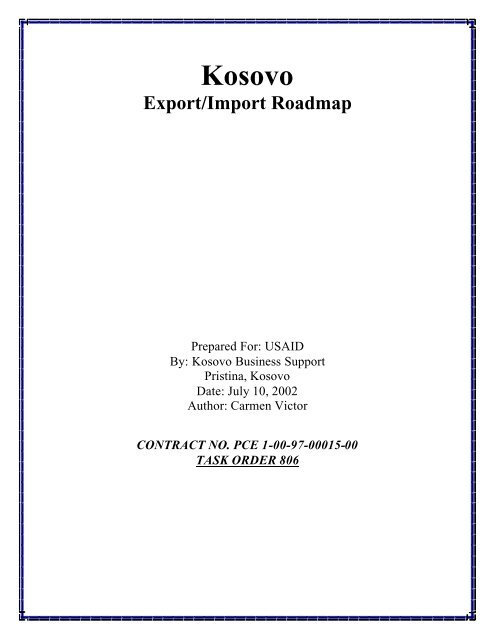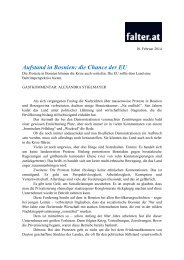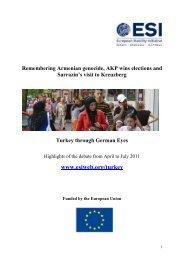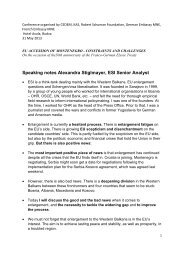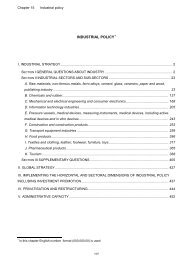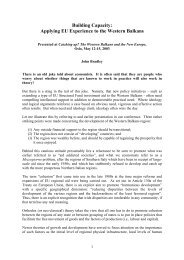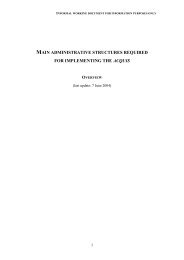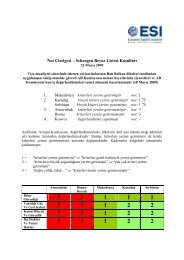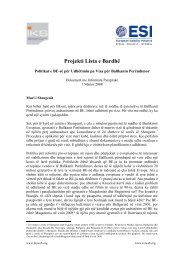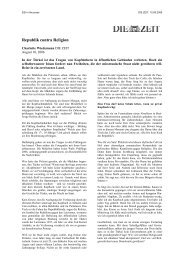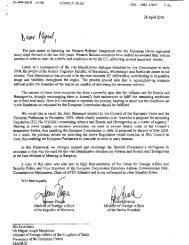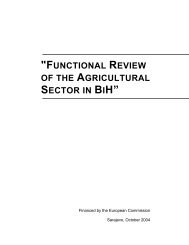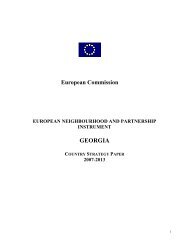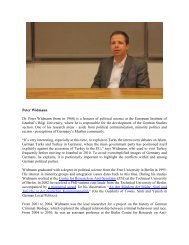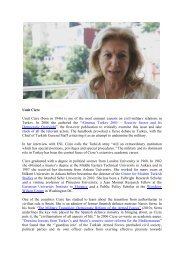Kosovo - ESI
Kosovo - ESI
Kosovo - ESI
You also want an ePaper? Increase the reach of your titles
YUMPU automatically turns print PDFs into web optimized ePapers that Google loves.
<strong>Kosovo</strong><br />
Export/Import Roadmap<br />
Prepared For: USAID<br />
By: <strong>Kosovo</strong> Business Support<br />
Pristina, <strong>Kosovo</strong><br />
Date: July 10, 2002<br />
Author: Carmen Victor<br />
CONTRACT NO. PCE 1-00-97-00015-00<br />
TASK ORDER 806
KOSOVO EXPORT/IMPORT ROADMAP<br />
TABLE OF CONTENTS<br />
EXECUTIVE SUMMARY _________________________________________________1<br />
INTRODUCTION – EXPORTS AND REGIONAL INTEGRATION _________________3<br />
1 – CUSTOMS ORGANIZATION IN KOSOVO_________________________________5<br />
Entry points ___________________________________________________________5<br />
Road transport network __________________________________________________5<br />
Customs terminals in <strong>Kosovo</strong> ______________________________________________7<br />
2 – UNMIK COMPETENCE ON CUSTOMS IN KOSOVO ________________________7<br />
UNMIK Regulation 3/1999 _______________________________________________7<br />
Administrative Direction 7/2001____________________________________________8<br />
Administrative Direction no. 2001/8 _________________________________________8<br />
3 – TRADE AGREEMENTS IN FORCE _______________________________________9<br />
Between <strong>Kosovo</strong> and neighboring jurisdictions ________________________________9<br />
Agreements Between Business Organizations _________________________________12<br />
The Stabilization and Association Agreements for South Eastern Europe – Stability Pact<br />
Negotiations. _________________________________________________________12<br />
4 – TRADE REGIMES IN AND OUT OF KOSOVO ____________________________12<br />
Imports and Intra-Fry Inflows of Goods – Transit Regime Into <strong>Kosovo</strong> _____________12<br />
Exports and Intra-Fry Outflows of Goods – Transit Regimes Applied by Neighboring<br />
Jurisdictions. _________________________________________________________14<br />
Exporting to FYR Macedonia ___________________________________________14<br />
Transit Through FYR Macedonia ________________________________________15<br />
Exporting to Albania _________________________________________________16<br />
Transit Through Albania ______________________________________________16<br />
Outflow Regime to Montenegro _________________________________________16<br />
Transit Through Montenegro ___________________________________________17<br />
Outflow Regime to Serbia _____________________________________________18<br />
Transit Through Serbia ________________________________________________18<br />
Special Customs Regimes________________________________________________19<br />
Inward Processing Relief (IPR) _________________________________________19<br />
Temporary imports, temporary exports ____________________________________19<br />
Transit Regime. _____________________________________________________19<br />
5 – NON-TARIFF BARRIERS TO TRADE____________________________________20<br />
Non-Tariff Barriers to Trade in <strong>Kosovo</strong> _____________________________________21<br />
Non-Tariff Barriers to Trade in Albania _____________________________________22<br />
Non-Tariff Barriers to Trade in Montenegro __________________________________23<br />
i
KOSOVO EXPORT/IMPORT ROADMAP<br />
Non-Tariff Barriers to Trade in Serbia ______________________________________24<br />
6 – CASES_____________________________________________________________25<br />
Case nr. 1 Outflow to Montenegro_________________________________________25<br />
Case nr. 2. Inflow from Serbia ____________________________________________25<br />
Case nr. 3 . Outflow from <strong>Kosovo</strong> to Serbia.__________________________________25<br />
Case nr. 4. Export to Macedonia. __________________________________________26<br />
Case nr. 5. Temporary export of samples to FYR Macedonia._____________________26<br />
Other cases (anecdotal). _________________________________________________26<br />
7 – CONSOLIDATED GUIDE TO EXPORTS _________________________________27<br />
Requirements for Each Export Transaction ___________________________________27<br />
FYR Macedonia _______________________________________________________28<br />
Exporting to FYR Macedonia ___________________________________________28<br />
Transit Through FYR Macedonia ________________________________________28<br />
Albania _____________________________________________________________29<br />
Exporting to Albania _________________________________________________29<br />
Transit Through Albania ______________________________________________29<br />
Montenegro __________________________________________________________29<br />
Shipments to Montenegro______________________________________________29<br />
Transit Through Montenegro ___________________________________________30<br />
Serbia _______________________________________________________________30<br />
Shipments to Serbia __________________________________________________30<br />
Transit Through Serbia ________________________________________________31<br />
Special Customs Clearance Procedures______________________________________31<br />
Inward Processing Relief ______________________________________________31<br />
Temporary Imports/Temporary Exports ___________________________________31<br />
Transit ____________________________________________________________31<br />
8 – BILATERAL TRADE FLOWS 2001 and 2002 ______________________________32<br />
Imports – Inflows ______________________________________________________32<br />
9 – MAPs AND FIGURES _________________________________________________34<br />
10 – USEFUL CONTACTS ________________________________________________42<br />
<strong>Kosovo</strong>______________________________________________________________42<br />
Montenegro __________________________________________________________45<br />
Macedonia ___________________________________________________________47<br />
Serbia _______________________________________________________________48<br />
Albania _____________________________________________________________52<br />
CASES<br />
ANNEXES<br />
ii
KOSOVO EXPORT/IMPORT ROADMAP<br />
EXECUTIVE SUMMARY<br />
<strong>Kosovo</strong> is progressively introducing infrastructure and regulatory measures to facilitate<br />
trade with its neighbors and increase its regional integration. Steps about to be taken<br />
include opening new entry points along the international borders and Administrative<br />
Boundary Line, restarting the commercial railway traffic through <strong>Kosovo</strong> and<br />
reestablishing a transit regime with the parallel licensing of customs warehouses. These<br />
efforts to increase trade are departing from the framework of the post-war customs<br />
organization and taxation system laid out in UNMIK Regulation 3/1999 and AD 2001/7<br />
and 2001/8 which remain in force.<br />
The Free Trade Agreement between FRY and Macedonia honored by UNMIK and some<br />
non-binding MOUs are also part of <strong>Kosovo</strong>’s regulatory framework. The former defines<br />
the rules of origin and the extent of UNMIK competence to issue Customs documents.<br />
Inspection authorities –Ministry of Health- and the appointment of inspectors by the<br />
Ministry of Agriculture are also addressed in Regulation 3/1999.<br />
Though codes, agreements and memoranda of understanding are well developed,<br />
implementation problems exist. For example, while Section 8 of the MOU between<br />
UNMIK CS and the Customs Authorities of the Republic of Macedonia 2001 provides a<br />
basis for reciprocity given to goods entering Macedonia with a certificate of FRY origin<br />
stamped by UNMIK, daily practice contradicts this provision. A new Regulation of the<br />
Macedonian Ministry of Finance suppresses the 1% evidence tax.<br />
Of special relevance for economic integration between Serbia and <strong>Kosovo</strong> is the<br />
Agreement recently reached between the Public Revenue Service and the Central Fiscal<br />
Authority to avoid double taxation sales tax/VAT.<br />
At the business level, a network of non binding cooperation agreements has initiated a<br />
new trend with potentially strong impact in complementing the work done by the<br />
Administration –the bilateral agreement between the Chambers of Commerce of <strong>Kosovo</strong><br />
and Macedonia and a Declaration by Presidents of all Balkan Chambers of Commerce are<br />
considered in the Road Map.<br />
All these cooperation agreements need to be functional in the wider institutional<br />
framework of the non-binding decisions taken in the Stability Pact negotiations where<br />
<strong>Kosovo</strong> is now represented with non-voting rights and no capacity to participate in tariff<br />
reduction agreements both bilaterally or multilaterally. The Stability Pact roundtables<br />
seem to be the most appropriate forum to deal with these and other significant sources of<br />
regional trade distortion affecting <strong>Kosovo</strong>’s ability to export. One of them is the<br />
combination of the FTA binding Albania and Macedonia and the FTA between<br />
Macedonia and FRY.<br />
1
KOSOVO EXPORT/IMPORT ROADMAP<br />
Details of the bilateral import/export and transit regimes and the currently suspended<br />
special customs regimes are included as well as a description of non-tariff barriers to<br />
trade in each particular trade partner territory under survey.<br />
The numerous obstacles to trade found in neighboring territories range from political to<br />
legal and to other factors, such as the lack of appropriate coordination among banks to<br />
mention only one. An idea such as the proposed Agreement among Agencies for export<br />
insurance from the Balkan countries is suggested and briefly explained, an idea that<br />
certainly requires a catalyst.<br />
The Commercial policy orientation in the immediate future should aim at opening<br />
<strong>Kosovo</strong>’s market and at promoting increased competition. Such aim needs to be coupled<br />
with an effort to further organize the business environment. A fully operational exporters<br />
association is the suitable tool in that direction and it is now being formed.<br />
Additionally, a combination of the following means and goals is required:<br />
- Promoting political stability<br />
- Efficient taxation enforcement<br />
- Customs facilitation<br />
- Promoting reciprocity and confidence building with Customs administrations and<br />
business organizations.<br />
2
KOSOVO EXPORT/IMPORT ROADMAP<br />
INTRODUCTION – EXPORTS AND REGIONAL INTEGRATION<br />
<strong>Kosovo</strong> can accelerate its integration into regional and international markets by<br />
increasing its export trade. This export focus will also enable <strong>Kosovo</strong> to achieve<br />
sustainable growth more quickly, and will reduce its reliance on imports. Therefore,<br />
businesses in <strong>Kosovo</strong> must reorient themselves toward focusing on meeting the<br />
requirements in export markets.<br />
While exports from <strong>Kosovo</strong> are still relatively low, companies in its industrial sector<br />
must begin to understand, and incorporate into their business practices, the preferences<br />
and quality demanded in neighboring markets while delivering goods and services at<br />
competitive prices. Regional markets, including Macedonia, Serbia, Albania and<br />
Montenegro are initially the most likely export markets for <strong>Kosovo</strong>. Once developed, a<br />
regional market perspective will help lure foreign direct investment into <strong>Kosovo</strong>’s<br />
industrial sector.<br />
Expanding exports requires a concerted effort on a daily basis by companies here to<br />
expand trade with its neighbors. <strong>Kosovo</strong> will find its place in the regional economic<br />
matrix, itself designed to evolve towards a free trade area, alongside its trade partners in<br />
those markets. In the process, <strong>Kosovo</strong> will clarify its own comparative advantages in this<br />
rapidly changing environment and its businesses will become more competitive as a<br />
result. Measures to facilitate the easy movement of goods across <strong>Kosovo</strong>’s borders into<br />
the region will require the smooth implementation of regulatory practices both in<br />
<strong>Kosovo</strong>, and within the export markets.<br />
<strong>Kosovo</strong>’s market oriented economy will naturally cause it to desire to achieve integration<br />
within the regional economic context. This is a combination of the need for <strong>Kosovo</strong>’s<br />
producers to find additional markets for their products in order to achieve business<br />
growth, and the likelihood that, over time business alliances with partners from elsewhere<br />
in the region will occur, thereby opening additional market opportunities for businesses<br />
here. By engaging in regional trade to a larger extent and increasing their production<br />
capacities to serve exports markets, Kosovar businesses will benefit from economies of<br />
scale and lower their average costs of production.<br />
Regional integration and exports will require, and result in, improved levels of product<br />
quality by <strong>Kosovo</strong>’s manufacturers. Some of these improvements have already occurred,<br />
and they have yielded good results for businesses here. These initial improvements<br />
provide reasonable grounds to expect further progress. Businesses here, though, must also<br />
move beyond an often self-imposed belief that it is impossible to effectively penetrate<br />
export markets due to regulatory barriers either within <strong>Kosovo</strong>, or in the markets<br />
targeted.<br />
As part of a larger promotional endeavor, it is necessary for Kosovar businesses to<br />
educate themselves about the administrative procedures that are actually in place, identify<br />
obstacles that they may encounter, and constructively work with their colleagues in both<br />
the private and publics sectors to overcome these.<br />
3
KOSOVO EXPORT/IMPORT ROADMAP<br />
<strong>Kosovo</strong>’s exports were traditionally insufficient both in quantity and in quality. While<br />
energy, non-ferrous metals, ferrous metallurgy, machine components and electric<br />
equipment used to be the leading sectors, the effort to reach exports markets at the current<br />
stage needs to be pursued by other branches of the economy.<br />
The corresponding requirement for export growth is the need for raw materials and<br />
equipment for production. Depending on the industry, many of these are imported. Issues<br />
related to the efficient import of raw materials that Kosovar businesses require to produce<br />
value added products must also be addressed.<br />
This Import/ Export Road Map addresses all aspects involved in trade with the four<br />
neighboring territories of Macedonia, Serbia, Albania and Montenegro pointing at the<br />
current obstacles – both tariff and non-tariff barriers – that Kosovar exporters to these<br />
markets actually encounter. It provides detailed and documented information necessary to<br />
understand the regulatory and administrative processes required to properly complete an<br />
export transaction. Transit regimes in and out of Macedonia, Serbia, Albania and<br />
Montenegro are included. In addition, some aspects of international sales contracts in the<br />
most likely exporting and importing scenarios are addressed.<br />
4
KOSOVO EXPORT/IMPORT ROADMAP<br />
1 – CUSTOMS ORGANIZATION IN KOSOVO<br />
Entry points<br />
The territory of <strong>Kosovo</strong> which is comprised inside the borders defined by UNSC Res.<br />
1244 is under UNMIK jurisdiction for Customs related matters and covers 10,887 sq.<br />
kilometers It shares international borders with the Former Yugoslavian Republic of<br />
Macedonia to the South with Albania to the West and South West and with UNMIK<br />
defined administrative boundaries (ABL) between <strong>Kosovo</strong> and the Republic of Serbia<br />
and Montenegro to the North and to the East respectively.<br />
Traffic of goods and persons between <strong>Kosovo</strong> and the neighboring territories flows<br />
normally through the entry points or border crossings established on the main roads.<br />
There are currently ten entry points, four of them being border crossings and the others<br />
tax collection offices.<br />
These entry points are : (see fig. 1)<br />
- Gate Hen/D31 Zubin Potok (Municipality of Mitrovica) to Serbia. Sift point for<br />
TCO in Mitrovica.<br />
- Gate 1 Leposavic (Municipality of Mitrovica) to Serbia. Sift point to TCO in<br />
Mitrovica.<br />
- Gate 3 Merdare (Municipality of Podujevo) to Serbia TCO.<br />
- Gate 5 Dheu I Bardhe (Municipality of Gjilan) to Serbia. TCO.<br />
- Hani I Elezit (Municipality of Hani I Elezit) to Macedonia. Customs Station<br />
- Vermica (Municipality of Prizren) to Albania. Customs station<br />
- Kulla (Municipality of Peja) to Montenegro. Sift point for Peja TCO<br />
- Pristina International Airport. Customs station<br />
According to the Customs service two more gates will open in the course of this year:<br />
Gate 4 Medveje and Gate 6 Kamenica.<br />
Road transport network<br />
The territory of <strong>Kosovo</strong> is served by a road network whose total length is 1800<br />
kilometers with some 500 kilometers of main roads often used for <strong>Kosovo</strong>’s freight<br />
traffic. Freight traffic across the border is estimated at about 25.000 metric tons per day<br />
and is mainly passing to and from Serbia, Montenegro and Macedonia.<br />
Road E-80, the route between Mitrovica and Skopje via Prishtina is becoming especially<br />
important to <strong>Kosovo</strong> for regional transport. It has been nominated as an east-west<br />
connection under the UN ECE system but its development is more by decree than the<br />
more traditional “corridors” used elsewhere in the region. Its status is merely part of a<br />
route that national governments may develop. By contrast, route E-75, a more traditional<br />
route, circumvents <strong>Kosovo</strong>. It follows part of Corridor 10, a geographic path identified<br />
for transport development over 30 years ago and was to connect Greece with Europe.<br />
5
KOSOVO EXPORT/IMPORT ROADMAP<br />
Road E-75 is going around <strong>Kosovo</strong> and connecting directly Belgrade to Kumanovo and<br />
Skopje through Nis and to Thessaloniki in Greece. Similarly, corridor 8 was also<br />
promoted steadily over the last thirty years to connect east-west Italy and Turkey. A part<br />
of it has been developed (see European continental road network. Fig.2).<br />
Although road capacity in <strong>Kosovo</strong> is believed to be below demand, available analysis<br />
suggests that road capacity in <strong>Kosovo</strong> appears adequate. Ratings supplied by the Ministry<br />
of Transports and Communications indicate that serviceability and accessibility of the<br />
road network are good and intensity of use is average. There are only isolated congestion<br />
points like between Pristina and Lipjan where traffic reaches 12 to 13 thousand vehicles<br />
per day. As a consequence of the limited congestion, the need to justify large new<br />
projects and the existence of road E-75 suggest that it is very unlikely that a freeway<br />
project across <strong>Kosovo</strong> is realistic.<br />
Congestion at border crossing points and TCOs is an issue. The waiting time for trucks to<br />
go through customs clearance in Mitrovica and Hani I Elezit (the most congested points)<br />
can range from several hours to a whole day.<br />
However, roads around <strong>Kosovo</strong> are getting damaged. The weight they can bear is<br />
somewhat lower than the European standard (10 metric tons instead of 11.25 metric tons<br />
per axel). But even if the quality of the roads increasingly used for heavy traffic is an<br />
issue, there is insufficient budget allocation to repair them due to insufficient fees<br />
collected from car registration and non reception of the amount committed by the<br />
European Commission for repairing road infrastructure.<br />
There is no transportation of goods by railway in transit through <strong>Kosovo</strong> for the time<br />
being. In such situations greater use of the rail transit can help protect a country’s road<br />
system. Freight railroad transportation could be rehabilitated. Customs clearance for<br />
goods coming into <strong>Kosovo</strong> from Macedonia by railway is conducted at Hani I Elezit and<br />
Pristina. An MOU has been signed between UNMIK railway and ZTP Belgrade for rail<br />
transportation of commercial goods. The first train will start on June 27 th and the<br />
timetable is expected in two months.<br />
In the region some bilateral agreements are in force (i.e.: between Montenegro and<br />
Albania) concerning rail freight and rail freight facilities. The current situation suggests<br />
that these railroad transports agreements will diminish <strong>Kosovo</strong>’s share of regional trade.<br />
Most important for <strong>Kosovo</strong>’s trade facilitation perspectives is the agreement on rail<br />
freight which has been recently signed by the SRSG Michael Steiner with the Serbian<br />
Ministry of Transports whereby the railway from Belgrade to Skopje for transportation of<br />
commercial goods will restart. Its consequence as far as improving cost effectiveness of<br />
transport in <strong>Kosovo</strong> are important since trade facilitation achieved by transport<br />
facilitation and its repercussion on the share of transport cost in the total cost of the goods<br />
is a main point. These costs are currently calculated to reach 30%. Transport costs are<br />
also high for the <strong>Kosovo</strong> Consolidated budget where they amount to some 50 – 60% of<br />
the expenses.<br />
6
KOSOVO EXPORT/IMPORT ROADMAP<br />
Customs terminals in <strong>Kosovo</strong><br />
A main trade facilitation measure which has started being implemented to some extent by<br />
UNMIK Customs Service is the rehabilitation of certain locations in <strong>Kosovo</strong> to serve the<br />
increased needs of operators –especially importers– to clear the imported goods from<br />
Customs at their convenience. At a later stage when the regulation of the transit regime<br />
through <strong>Kosovo</strong> which is being drafted will be approved, these Customs terminals will<br />
enable the Customs Service to reintroduce the currently suspended Transit regime.<br />
UNMIK Customs Service has authorized the operation of four Customs Terminals, one<br />
of them in Peja for the main route from Montenegro, and very recently one in Podujevo<br />
for the main route from Serbia through Gate 3. They are both privately run with UNMIK<br />
CS authority to clear and tax commercial goods. Another UNMIK CS terminal operates<br />
at Mitrovica which will be relocated in a better facility in the Trepca complex as an<br />
interim measure pending establishment of privatized facilities. In Hani I Elezit the<br />
Customs Terminal is located in the Sharr-Salonit Factory. (Details of the indicated<br />
Customs Terminals can be found in the useful contacts section). See fig. 3 – Location of<br />
customs warehouses in <strong>Kosovo</strong>.<br />
2 – UNMIK COMPETENCE ON CUSTOMS IN KOSOVO<br />
With <strong>Kosovo</strong>’s current international status being that of a province of the Federal<br />
Republic of Yugoslavia, with de facto independence, it can be said to be a separate tax<br />
entity due to its exceptional circumstances.<br />
The competencies of the UNMIK Customs Service lie in a number of legal instruments:<br />
The Yugoslav Customs Law is still applicable generally and most competencies relating<br />
to administration of powers and procedures lie in that. Also, a number of UNMIK<br />
regulations – most relevant is 3/1999 – and Administrative Directions –AD 7/2000 –<br />
apply. They relate to customs powers at the international borders.<br />
At the Administrative Boundary Line UNMIK CS in some cases acts on behalf of the tax<br />
authority – CFA- and their somewhat limited powers derive from Taxation Regulations<br />
and AD – AD 8/2001 is the best example.<br />
UNMIK Regulation 3/1999<br />
(see Annex 1)<br />
This regulation is the basic text laying out the authority of UNMIK over Customs in<br />
<strong>Kosovo</strong> in accordance with UNSC Res. 1244 and Reg. Nr. 1999/1 defining UNMIK<br />
general authority in <strong>Kosovo</strong>. It lays out the basic tariff flat rate of 10% with a transitional<br />
character as well as the excises for a closed list of goods (Annex II) when imported into<br />
<strong>Kosovo</strong> plus the sales tax calculated on the total customs value including tariffs and the<br />
7
KOSOVO EXPORT/IMPORT ROADMAP<br />
excise. The sales tax collected at the border was replaced by the VAT collected inland in<br />
June 2001. It suspends any quantitative restrictions to imports and allocates to the<br />
<strong>Kosovo</strong> Consolidated Budget all revenues derived from Customs and excise duties.<br />
Administrative Direction 7/2001<br />
(see Annex 2)<br />
This AD is a development of the aforementioned Regulation and it establishes that the<br />
tariff based on the Harmonized System of the World Customs Organization will continue<br />
to apply in <strong>Kosovo</strong> as well as the tariff level of 10% flat rate. Goods originating in FRY<br />
transported into <strong>Kosovo</strong> will not be subject to Customs duties.<br />
This AD introduces amendments to the basic Import and Export regime (FRY law<br />
still applicable) to give competence to UNMIK to issue import/export certificates<br />
and customs documents.<br />
It follows from the text of this AD that the tax authority in <strong>Kosovo</strong> is the CFA.<br />
The Ministry of Agriculture, Forestry and Rural Development is responsible for<br />
appointment of phyto-sanitary and veterinary inspectors. The inspection authority<br />
is the Ministry of Health and Social Welfare.<br />
Importers/Exporters and forwarding agents need to be registered with the<br />
Customs Service.<br />
Section 8 suspends customs regimes other than the general import/export regimes.<br />
Hence, transit through <strong>Kosovo</strong> is generally suspended unless expressly authorized<br />
by the Director General of UNMIK CS. This provision leaves room for a case by<br />
case authorization of the Inland Clearance Depots. The Director General of<br />
UNMIK CS is the competent authority to grant transit arrangements following a<br />
consultation procedure with the Ministry of Trade and Industry and the Central<br />
Fiscal Authority. The Customs Assistance Mission in <strong>Kosovo</strong> (CAM-K) is<br />
currently drafting a regulation for transit in view of reestablishing the regime. The<br />
transit regime will be dependant on a system of bank guarantees.<br />
Administrative Direction no. 2001/8<br />
(see Annex 3)<br />
It is a development of UNMIK Reg. Nr. 1999/16 on the establishment of the<br />
Central Fiscal Authority in <strong>Kosovo</strong>.<br />
It establishes the approved routes for the transport of commercial goods by<br />
commercial means of transports.<br />
Although UNMIK competence over customs in <strong>Kosovo</strong> is clearly set out in the Trade<br />
Agreements and MOUs with neighboring jurisdictions (all of them summarized in<br />
Section 3 and attached to this report) the implementation of all of them is problematic.<br />
8
KOSOVO EXPORT/IMPORT ROADMAP<br />
One of the main issues is the lack of recognition given by customs authorities at the<br />
Macedonian border to one of the required documents – EUR-1 which is the certificate of<br />
origin issued by UNMIK CS in accordance with the terms of the MOU between UNMIK<br />
CS and CS of Macedonia. It is used whenever a preferential agreement is in place, as it is<br />
the case between FRY and the Republic of Macedonia, which is affecting exports from<br />
<strong>Kosovo</strong> to Macedonia even though the stated origin of the goods is FRY. This case will<br />
be developed under the chapter dedicated to non-tariff obstacles.<br />
3 – TRADE AGREEMENTS IN FORCE<br />
Between <strong>Kosovo</strong> and neighboring jurisdictions<br />
According to the terms of the UNSC Res 1244 of June 10 1999 UNMIK has the<br />
obligation to maintain the International Agreements in force under the previous situation.<br />
UNMIK can be regarded as the successor entity of the Republic of Serbia, up to the<br />
extent provided for in this Resolution, with competence on Customs related issues among<br />
other external relations related areas.<br />
With the final international status of <strong>Kosovo</strong> still being undecided, UNMIK competence<br />
to negotiate and sign Trade Agreements is limited. Even though only sovereign states<br />
have Treaty making power, UNMIK competence to negotiate and sign Memoranda of<br />
Understanding on taxation issues and customs related matters has been generally<br />
recognized by its neighbors – which is fully consistent with the basic principle stated by<br />
UNSC Res. 1244 according to which the sovereignty over the province of <strong>Kosovo</strong> rests<br />
in the Republic of Serbia of which <strong>Kosovo</strong> is an integral part – but it is still problematic<br />
from the day by day enforcement perspective.<br />
As a result of the combined effect of the different legal instruments in force – see<br />
reference hereunder – the Macedonian Customs Authorities do not recognize goods<br />
originating in <strong>Kosovo</strong> but they recognize goods originating in FRY. They also accept<br />
EUR-1 certificates of FRY origin of the goods issued by UNMIK for goods produced in<br />
<strong>Kosovo</strong>. This leads to a contradictory situation where in practice the indicated certificates<br />
are overlooked and left aside by the Macedonian Customs authorities and forwarding<br />
agents there. Such a situation lends itself to arbitrary fee collection by enforcing and<br />
forwarding agents.<br />
The main practical consequence arising from this situation has been the lack of reciprocal<br />
treatment given by the Customs Service of the Former Yugoslavian Republic of<br />
Macedonia to goods manufactured in <strong>Kosovo</strong> being imported there which makes this<br />
important neighboring market practically inaccessible for Kosovar producers. On the<br />
other hand Macedonian producers enjoy the advantage of the trade preference derived<br />
from the FTA of 1996 between FRY and Macedonia whereby goods produced in<br />
Macedonia are only charged a 1% evidence tax when entering <strong>Kosovo</strong>. This<br />
discrimination accounts not only for the fact that the productive capacity to serve the<br />
9
KOSOVO EXPORT/IMPORT ROADMAP<br />
Kosovar market is currently located in Macedonia but also for an additional incentive for<br />
investors to go to Macedonia rather than to <strong>Kosovo</strong>.<br />
UNMIK competence on customs taxation is limited. Due to its inability to negotiate and<br />
sign FTAs it cannot participate in multilateral or bilateral tariff reduction negotiations.<br />
Consequently, the following legal instruments are currently applicable and honored by<br />
UNMIK:<br />
Free Trade agreement between the Federal Government of the FRY and the Government<br />
of the Republic of Macedonia<br />
Signed in Skopje on 4.5.1996. This agreement is specially relevant as far as the rules to<br />
determine the origin of the goods which are contained in its Annex II. A different issue is<br />
the proof of the origin in FRY of the goods produced in the territory of <strong>Kosovo</strong> which<br />
according to the paragraphs 2 and 3 of point 2 of the Memorandum of Understanding<br />
signed in Skopje in 2001 is to be issued by UNMIK CS and the Customs Administration<br />
of the Republic of Macedonia. Some problems derived from this agreement have arisen<br />
very recently, including an issue regarding the import of Yugo cars into Macedonia.<br />
Other problems have arisen for Kosovar operators sending goods to Macedonia.<br />
Examples are provided under Non-tariff barriers to trade and documented in attachments.<br />
Memorandum of Understanding between UNMIK Customs Service and the Customs<br />
Administration of the Republic of Macedonia.<br />
(see Annex 4)<br />
This agreement addresses the need for closer Customs cooperation in simplification of<br />
Customs formalities, in working hours harmonization and in prosecution of customs<br />
related offences. It establishes the conditions and modalities of use of the Blace border<br />
crossing and creates the Joint Committee for the monitoring of the implementation of the<br />
MOU.<br />
The last paragraph of the Memorandum mentions the commitment by UNMIK to<br />
establish a transit corridor for goods to go from Macedonia to Montenegro and viceversa.<br />
Since there is presently no transit through <strong>Kosovo</strong>, nor an established transit<br />
procedure, that provision is still pending. There is a proposed draft of a Working<br />
Technical Agreement to be signed between UNMIK and Macedonia for transiting the<br />
goods through <strong>Kosovo</strong> to Montenegro. Transit through <strong>Kosovo</strong> was allowed in a few<br />
cases by the Director-General of UNMIK Customs Service. A written request to the<br />
Director-General of CS is needed to obtain the authorization for a particular case.<br />
Most importantly, the Memorandum states the authority of UNMIK CS and the Customs<br />
Authority of Macedonia to issue EUR-1 certificates. This recognition will hopefully<br />
translate into practice after the stamps transmission on June 10, 2002.<br />
10
KOSOVO EXPORT/IMPORT ROADMAP<br />
Regulation on conditions and procedure of the Public Revenue Accounting, contents and<br />
method of keeping records on turnover of goods from AP <strong>Kosovo</strong> and Metohija.<br />
(See Annex 5)<br />
It provides for a way to make compatible the different rates applicable in <strong>Kosovo</strong> and in<br />
Serbia for the VAT and the sales tax. In this way it will contribute to prevent smuggling<br />
to avoid double taxation. On the basis of this regulation an agreement has been signed<br />
recently between the Public Revenue Service and the CFA whereby its provisions will be<br />
effective.<br />
According to this regulation goods originating in <strong>Kosovo</strong> going to Serbia will pay a 5%<br />
sales tax at destination to the Public Revenue Service.<br />
Goods of high revenue value (those that are subject to excises) will be charged with an<br />
extra tax amounting to the equivalent of 168,000 dinars in foreign currency per tank or<br />
other in proportion to the quantity.<br />
The benefits provided for can be obtained under condition that the business is registered<br />
at the CFA for the VAT refund. A specific form will be created different from the one<br />
used for the VAT refund (see sample documents in Annex 13). By means of these<br />
specific forms a proof of the sales to Serbia will be kept which will allow the recording<br />
and quantification of these transactions.<br />
For goods originating in third countries transiting through Serbia with a destination to<br />
<strong>Kosovo</strong> or goods made in <strong>Kosovo</strong> in transit through Serbia, a transit fee is applicable.<br />
The transit fee amounts to 5% with an additional 4% charged for petroleum tax.<br />
This agreement has been challenged by nationalist parties in Serbia on the grounds that it<br />
implies a certain recognition of UNMIK competence on taxation over the territory of<br />
<strong>Kosovo</strong>, whereas given the better coordination it brings with the Serbian taxation system<br />
it is often disliked by Kosovar Albanian operators.<br />
Memorandum of Understanding between the Customs Administration of the Republic of<br />
Albania and the Customs service of UNMIK on cooperation and mutual assistance on<br />
Customs matters.<br />
(see Annex 6)<br />
The parties state their commitment to assist each other in the prevention, investigation<br />
and repression of Customs offences as well as exchange of information on applicable<br />
Customs Law. It is also intended to facilitate cross-border flows of goods and persons.<br />
It contains no specific trade facilitation measures with impact on operators.<br />
11
KOSOVO EXPORT/IMPORT ROADMAP<br />
Agreements Between Business Organizations<br />
(see Annexes 7 and 8)<br />
A network of cooperation and partnership agreements is in place. The Chamber of<br />
Commerce of <strong>Kosovo</strong> has signed agreements with partner organizations in the Balkans.<br />
There is a most recent Declaration by Representatives of Chambers of Commerce of the<br />
former Yugoslav republics and provinces stating the commitment to the liberalization<br />
process and the elimination of obstacles for free circulation of goods and factors of<br />
production.<br />
The Stabilization and Association Agreements for South Eastern<br />
Europe – Stability Pact Negotiations.<br />
<strong>Kosovo</strong> is represented in the Stability Pact negotiations and roundtables and it is<br />
participating in them with a special status. It has no voting rights and cannot engage in<br />
FTA negotiations either bilaterally or multilaterally.<br />
Given these limitations, both the local Government and UNMIK are currently engaged in<br />
the process of trying to find the legal procedure to get the benefits of tariff reductions.<br />
<strong>Kosovo</strong> could perhaps sign MOUs with neighbors on trade facilitation and liberalization<br />
for <strong>Kosovo</strong> to accrue the benefits of tariff reductions. MOUs, however, are non binding<br />
instruments and have limited practical effect.<br />
Currently the member countries of the Stability Pact are in the process of exchanging lists<br />
of products that could be subject to liberalization.<br />
Tariff reforms in <strong>Kosovo</strong> will need to go through the Stability Pact since the legislation<br />
concerning Customs is still generally applicable in <strong>Kosovo</strong> for whatever is not covered<br />
specifically by UNMIK regulations and Administrative Directives. At the present stage,<br />
Albania and Macedonia have a FTA while <strong>Kosovo</strong> and Albania, two natural trade<br />
partners, do not. This fact accounts for a source of trade diversion affecting <strong>Kosovo</strong>’s<br />
possibilities to trade in the region. It results in a distortion for <strong>Kosovo</strong> businesses<br />
exporting to Albania or Albanian producers exporting to <strong>Kosovo</strong>.<br />
4 – TRADE REGIMES IN AND OUT OF KOSOVO<br />
Imports and Intra-Fry Inflows of Goods – Transit Regime Into <strong>Kosovo</strong><br />
Since UNMIK initiated its mandate on the territory of <strong>Kosovo</strong> according to UNSC<br />
Resolution 1244 and UNMIK Regulation nr. 1999/1 the general import regime into<br />
<strong>Kosovo</strong> applicable to goods originating in third countries is laid out in UNMIK<br />
Regulation 1999/3 and developed in several AD particularly AD nr. 2001/7 (see legal<br />
instruments in attachment).<br />
12
KOSOVO EXPORT/IMPORT ROADMAP<br />
All goods imported into <strong>Kosovo</strong> are subject to a 10% flat rate customs duty on their<br />
value. Goods entering <strong>Kosovo</strong> originating in the neighboring territories of Serbia and<br />
Montenegro are treated as Intra-FRY transactions and are not charged tariffs. Whenever<br />
they are applicable, excises for the specified goods of high revenue value (Annex II of<br />
UNMIK Reg 1999/3) are charged on both intra-FRY inflows and imports from<br />
Macedonia and Albania at variable rates depending on the goods. A 15% VAT is charged<br />
on all imports and intra-FRY inflows and it is collected at destination. Goods in transit<br />
through Serbia and Montenegro originating in third countries are imported into <strong>Kosovo</strong><br />
paying the normal tariff rate of 10% and bearing the remaining taxation. (See fig. 4.)<br />
Goods originating in the FYR Macedonia imported into <strong>Kosovo</strong> are the exception to the<br />
applicable tariff of 10% as a result of the Free Trade Agreement between the Federal<br />
Republic of Yugoslavia and the FYR Macedonia. These goods are only charged a 1%<br />
evidence tax. The indicated FTA, which is a source of serious trade distortion affecting<br />
imports to FRY from many Balkan countries and induces many operators to fake the<br />
origin of the goods, is in force and honored by UNMIK. Reciprocity should be granted<br />
on the basis of the same agreement and the MOU between UNMIK and the FYR<br />
Macedonia of 2001 by the Macedonian Customs authorities to goods made in <strong>Kosovo</strong><br />
provided that they are covered by the EUR-1 certificate issued by UNMIK Customs<br />
Service proving their origin in FRY (see Non-tariff barriers to trade).<br />
For goods originating in Serbia entering <strong>Kosovo</strong> a certificate is required – Izjava – (see<br />
sample in case nr. 3 under heading nr. 6) for the importer to avoid double taxation for<br />
Sales tax/VAT in Serbia and <strong>Kosovo</strong>. Such a transaction will be charged 15% VAT at<br />
destination as provided for by the recent agreement between the CFA and the Public<br />
Revenue Service in Serbia. Other documents required are: Commercial invoice and CMR<br />
transports document.<br />
For goods originating in Macedonia or Albania and imported into <strong>Kosovo</strong>, a Customs<br />
declaration according to the Single Administrative Document model is required plus the<br />
CMR and the commercial invoice. For imports of goods originating in Macedonia a<br />
circulation certificate EUR-1 proving the origin of the goods is additionally required as<br />
indicated above.<br />
A simplified Customs clearance procedure, with cash receipt, is applied in TCO-<br />
Mitrovica (Gate 1 and Gate Hen), Merdare – Gate 3 and Dheu I Bardhe – Gate 5. A<br />
commercial invoice and CMR need to be presented.<br />
The regular customs clearance procedure that includes the Single Administrative<br />
Document declaration is applied in these Customs stations: Hani I Elezit, Peja, Vermica,<br />
Pristina Airport and in Merdare-Podujevo. Other documents that need to be presented<br />
are: Commercial invoice, CMR, waybills, cargo manifests, packing lists, different goods<br />
specifications and lists, customs documents from the origin countries/territories and other<br />
relevant documents. A list of forwarding agents licensed by UNMIK Customs Service to<br />
assist in preparing the shipment’s administrative requirements is attached as Annex 9.<br />
13
KOSOVO EXPORT/IMPORT ROADMAP<br />
The simplified procedure does not require the SAD nor the assistance by the forwarding<br />
agent. All TCOs along the defined administrative boundaries are following the simplified<br />
procedure for clearance of the goods.<br />
Documents required by UNMIK CS for goods transiting through the four neighboring<br />
territories of Serbia, Montenegro, Macedonia and Albania are:<br />
?? Commercial invoice stamped at each border crossing,<br />
?? Exports declaration covered by the SAD from the country of origin stamped at<br />
each border crossing,<br />
?? An EUR-1 certificate from the country of origin, and<br />
?? A declaration of transit is required for goods transiting through Montenegro and<br />
Macedonia.<br />
The authorization by UNMIK to import and the VAT registration certificate are also<br />
required for transit into <strong>Kosovo</strong> as it is for imports transactions.<br />
Samples of all of these documents can be found in the cases attached to this report.<br />
Exports and Intra-Fry Outflows of Goods – Transit Regimes Applied by<br />
Neighboring Jurisdictions.<br />
Exporting to FYR Macedonia<br />
The above mentioned Free Trade Agreement between FRY and the FYR Macedonia of<br />
1996 is in force and is governing the bilateral trade regime for imports and exports with<br />
FYR Macedonia. It has been never suspended although growing imports of Yugo cars<br />
into Macedonia led the Macedonian Government to consider its eventual suspension.<br />
This Agreement in conjunction with the MOU between UNMIK CS and the Customs<br />
Administration of FYR Macedonia are the basis of a preferential reciprocal treatment<br />
whereby import and export transactions are free of customs duties and are only subject to<br />
a 1% evidence tax plus excises if the goods are of high revenue value plus 19%VAT, or<br />
in some cases a reduced rate of 5% for specific products at destination. The preference is<br />
granted upon presentation of the EUR-1 certificate stating FRY origin of goods stamped<br />
by UNMIK CS as provided for in the indicated MOU. A new regulation from the<br />
Ministry of Finance (Official Gazette of Republic of Macedonia nr. 102/01) in force since<br />
Jan. 1 st 2002 has suppressed the 1% evidence tax and has been replaced by a payment of<br />
19 Euro for Customs service fee.<br />
In practice however, there is no reciprocal treatment between <strong>Kosovo</strong>’s imports from<br />
Macedonia (charged 1% at Customs) and exports from <strong>Kosovo</strong> to Macedonia<br />
(theoretically charged with 1% but in practice exports from <strong>Kosovo</strong> are arbitrarily taxed<br />
under pretext that there is no recognition of EUR-1 certificates issued by UNMIK as<br />
proven in one of the cases attached to this report). According to a recently promulgated<br />
regulation from the Ministry of Finance, the 1% is not consistent with International trade<br />
14
KOSOVO EXPORT/IMPORT ROADMAP<br />
rules from WTO and therefore the only payment applicable is 19 Euro as a Customs<br />
service fee.<br />
Whenever a phyto-pathological or veterinary check is required, legal fees apply. The<br />
checks are carried out at the border crossings by inspectors. The same rules apply for<br />
imports of seeds, while frozen meat requires specific analysis and certification.<br />
Stenkovac, marked on the map, is the location where routine checks are conducted.<br />
Certification requirements are according to the European legislation and there is nothing<br />
specific for <strong>Kosovo</strong>.<br />
Quantitative restrictions (quotas) can be decided by the Government for certain goods.<br />
For these cases import licenses need to be obtained from CS in Macedonia.<br />
The required documents for an export transaction of goods originating in <strong>Kosovo</strong> to<br />
Macedonia are:<br />
?? Single Administrative Document,<br />
?? Commercial invoice,<br />
?? CMR or transport document, and<br />
?? The EUR-1 certificate.<br />
A forwarding agent should handle the transaction since it does not follow the simplified<br />
procedure (see documents in annex 12).<br />
- For Customs clearance through the simplified procedure no declaration of Exports<br />
is required (SAD format). All tax collection offices follow the simplified<br />
procedure.<br />
Exporters from <strong>Kosovo</strong> can use the Customs terminals in Macedonia that are located<br />
close to the border with <strong>Kosovo</strong> – Blace, Tetovo-Jazince and Skopje (see fig. 5)<br />
Transit Through FYR Macedonia<br />
Transit through Macedonia is charged a fixed fee of 100 Euro as Customs Supervisory<br />
Service. Excises are also charged in different percentages for goods in transit.<br />
Customs claims are first dealt with by the Customs Administration itself and a second<br />
instance is the Ministry of Finance in Skopje. It is possible for exporters from <strong>Kosovo</strong> to<br />
have legal assistance to handle their claims through the exporters association. (For road<br />
connections, entry points and customs warehouses in the Macedonian side of the border<br />
see fig. 5).<br />
15
KOSOVO EXPORT/IMPORT ROADMAP<br />
Exporting to Albania<br />
Goods made in <strong>Kosovo</strong> are charged the full tariff when they are imported into Albania in<br />
addition to a 20% sales tax. Excises are paid for some predetermined high revenue goods.<br />
In addition, all vehicles not registered in Albania will pay the road tax either as a daily<br />
fee or calculated according to the formula: Weight x Kilometers x 0.02. Operators will be<br />
charged according to the procedure whereby the highest amount is obtained. For a 40<br />
metric ton load the tax to be paid is about 170 USD.<br />
Certifications of health, phyto-sanitary and veterinary certificates issued in <strong>Kosovo</strong> by the<br />
competent authorities (Ministry of Health, Ministry of Agriculture) are recognized by the<br />
Customs Service in Albania. The same applies to drug licenses issued by the <strong>Kosovo</strong><br />
Drug Regulatory Authority. Food products need to be certified.<br />
According to Customs officials in the Kukes border point no major problems occur on the<br />
daily basis. About 50 to 60 trucks per day go across the border.<br />
Documents required for exports to Albania are:<br />
?? A certification of the origin of the goods, normally the EUR-1 certificate,<br />
?? exports declaration or the SAD,<br />
?? Authorization to export from UNMIK CS,<br />
?? Registration at UNMIK CS Pristina as importer/exporter, and<br />
?? The CMR.<br />
Customs warehouses in Albania next to the border are located in Morina about 150-200<br />
meters from the Kukes border crossing.<br />
Transit Through Albania<br />
A transit fee is applicable in Albania. Excises are also paid for transit and they are<br />
charged cumulatively after the value of the goods has been taxed with the transit fee.<br />
The main road for traffic linking <strong>Kosovo</strong> with Albania is from Prizren to Durres.<br />
(For road connections, entry points and the location of customs warehouses close to the<br />
<strong>Kosovo</strong>/Albania border see fig 6).<br />
Outflow Regime to Montenegro<br />
(See Annex 10)<br />
<strong>Kosovo</strong> and Montenegro are not bound by bilateral trade agreements. Considering the<br />
fiscal regime applied by the Customs authorities in Montenegro to goods originating in<br />
<strong>Kosovo</strong> it can be said to be an extreme case of lack of reciprocity. For UNMIK CS<br />
transactions with Montenegro are intra-FRY inflows and outflows while the Montenegrin<br />
Customs service treats inflows from <strong>Kosovo</strong> like imports from any other third country.<br />
16
KOSOVO EXPORT/IMPORT ROADMAP<br />
The normal tariff is applied for goods originating in <strong>Kosovo</strong>. Export and import<br />
restrictions apply in Montenegro for a small number of goods but about 95-97% of goods<br />
imported and exported are free of restrictions respectively.<br />
Tariff levels in Montenegro are laid out in Reg. 38/2000. According to this regulation<br />
tariff levels have been adjusted to the European principles of uniform, low and stable<br />
levels. Seventy-two percent of all tariff positions have tariff rates ranging from 0 to 3<br />
percent. As a result the average tariff rate in Montenegro is lower than 3%. For protected<br />
goods tariff rates range from 10 to 15 percent.<br />
In addition to the tariff that goods imported into Montenegro are charged, an evidence tax<br />
of 1%. On the basis of Customs Regulation 7/02 an excise also applies for certain goods<br />
of high revenue value. Sales tax is calculated on the value of the goods after the<br />
imposition of the tariff and, if applicable, the excises at variable rates between 15-24%<br />
depending on the type of the goods (art. 10 of reg. 4/94 and reg. 55/00).<br />
Most times the simplified import procedure will apply but otherwise an approval by the<br />
Central Bank of Montenegro following application is required. For goods subject to<br />
quantitative restrictions a special approval by the competent Ministry will be required and<br />
Customs will issue the import license.<br />
Customs clearance procedures will include phyto-pathological, veterinary or sanitary<br />
inspections carried out by inspectors at the border or labs in Montenegro.<br />
Documents required for the shipment include:<br />
Commercial invoice<br />
CMR,<br />
Certificate EUR-1<br />
Declaration in the SAD form –required by the Customs service in Montenegro<br />
that regards this outflows from <strong>Kosovo</strong> to Montenegro as imports.<br />
By contrast, UNMIK CS does not require the SAD Declaration for inflows from<br />
Montenegro which is consistent with the treatment of this transactions as intra-FRY<br />
inflows of goods.<br />
Operators in <strong>Kosovo</strong> can benefit from the VAT return by means of a declaration in the<br />
CS of the outflow country. In the absence of a document which is now being designed, a<br />
sort of SAD for intra-FRY sales of goods, the CS stamps the commercial invoice.<br />
Transit Through Montenegro<br />
(see annex 10)<br />
All goods in transit through Montenegro will be charged a transit tax of 3% according to<br />
Reg. 68/01 and 16/01. A transit tax of 5% will apply on coffee, alcohol and cigarettes.<br />
17
KOSOVO EXPORT/IMPORT ROADMAP<br />
No agreement regarding double taxation for Sales tax/VAT has been reached between<br />
UNMIK and Montenegro and therefore the 20% sales tax will be collected at destination.<br />
(See attached map for the road network, entry points and customs warehouses in<br />
Montenegro).<br />
Outflow Regime to Serbia<br />
(see Annex 11)<br />
Commercial transactions with Serbia are intra-FRY sales of goods with no tariffs<br />
applying. However, if the goods are originating in third countries they are to be declared<br />
at the ABL at the Customs check point and the regular tariff will apply. In such cases the<br />
documents required for an export transaction need to be prepared – commercial invoice,<br />
CMR, customs declaration with the SAD and certificate of origin of the goods EUR-1. If<br />
sanitary, veterinary inspections are required the goods will undergo check before customs<br />
clearance and the appropriate certificate is to be obtained. Clearance of fuel or oil<br />
derivatives requires the approval from the Serbian Ministry of Energy.<br />
For goods originating in <strong>Kosovo</strong> sales tax will apply in Serbia. On the basis of the recent<br />
agreement reached between the CFA and the Public Revenue Service of Serbia (see<br />
chapter 3 on Trade Agreements) to avoid double taxation the 5% difference between<br />
sales tax in Serbia (20%) and the VAT in <strong>Kosovo</strong> (15%) will be charged in Serbia. A new<br />
form is being designed for the operators to get this benefit. In the meantime they only<br />
need to be registered at the CFA for the VAT. The new forms will also provide a way for<br />
Customs to keep track of outflow transactions with Serbia. The proof of the transaction is<br />
also required by the Agreement.<br />
Transit Through Serbia<br />
(see annex 11)<br />
Transit shipments through Serbia are charged a 5% fee. Some local companies try to go<br />
in transit through Serbia and they are facing continuous problems. Most times they are<br />
sent back to <strong>Kosovo</strong> and they then try to reach their destination by going around Serbia.<br />
Customs warehouses in the Serbian side of the ABL are located in the points marked in<br />
the map in fig. 8.<br />
In Presevo there is an operating Customs terminal run by a forwarding agency “Gran<br />
Spedicija” (see useful contacts section). Fees charged depend on the kind of goods.<br />
Goods that are subject to excises pay a higher price. Usually one truck is charged 20 Euro<br />
for an overnight stay. Goods in the customs warehouses are exempted from the 5% transit<br />
fee payment.<br />
18
KOSOVO EXPORT/IMPORT ROADMAP<br />
Special Customs Regimes<br />
As provided for by Section 1 of UNMIK Regulation 1999/3 quantitative restrictions to<br />
imports are suspended. Special customs regimes other than the basic import regime are<br />
also suspended as established by Sec. 8 of UNMIK AD 2001/7. Inward Processing<br />
Relief (IPR) and the Transit regime are therefore affected and effectively suspended.<br />
Temporary imports are not affected and this special regime has remained in force all<br />
along.<br />
Inward Processing Relief (IPR)<br />
Also called “import for export”, IPR can be authorized by the Director-General of<br />
UNMIK CS on a case by case basis following a consultation procedure involving the<br />
CFA and the Ministry of Trade and Industry. A number of guarantees are required for<br />
this regime to be granted. So far it has only been authorized in very few cases<br />
Temporary imports, temporary exports<br />
This regime has never been suspended and guarantees are required. It allows the use in<br />
<strong>Kosovo</strong> with total or partial relief from import duties and without being subject to<br />
commercial policy measures of goods made out of <strong>Kosovo</strong> intended for re-export without<br />
having undergone any change except normal depreciation due to the use made out of<br />
them.<br />
There have been some cases of temporary exports allowed by UNMIK Customs Service.<br />
They relate to different machines/goods that had to be repaired/manufactured in other<br />
countries and then brought back to <strong>Kosovo</strong>. A written request with “strong reasons” is<br />
needed. It has to be submitted to the Customs Service together with other documents such<br />
as contracts, agreements and other relevant documents.<br />
Transit Regime.<br />
Transit regime was suspended by UNMIK Reg. 1999/3 The Director-General of UNMIK<br />
CS can authorize the operation of customs warehouses for trucks containing uncleared<br />
goods. Four customs Terminals, two of them privately operated, have been authorized so<br />
far. CAM-K is currently drafting the regulation that will reestablish transit through<br />
<strong>Kosovo</strong>.<br />
The transitional nature of the suspension is stressed in the Regulation which can be<br />
interpreted as a post-war emergency measure. The Customs Service is therefore in the<br />
process of creating the appropriate instruments to reestablish the special Customs regimes<br />
in the immediate future.<br />
19
KOSOVO EXPORT/IMPORT ROADMAP<br />
5 – NON-TARIFF BARRIERS TO TRADE<br />
In general terms, trade and cooperation in the region are inhibited by unstable political<br />
situations, unfair competition as a result of distorting tariff preferences and generalized<br />
smuggling as well as by protectionist rules and practices.<br />
Administrative procedures are excessively bureaucratic while customs and tax legislation<br />
is often poorly shaped.<br />
Trade partners for producers in <strong>Kosovo</strong> can be found in neighboring countries and<br />
territories. The most recent figures, however, show that raw materials, equipment and<br />
basic consumption goods are increasingly imported from countries other than the<br />
neighbors. Persistent tariff and non-tariff obstacles account for much of this trade<br />
distortion.<br />
As a basic measure of commercial policy the taxation reform of commercial flows of<br />
goods across the borders needs to be tackled in the immediate future in addition to<br />
focusing on market related factors.<br />
Commercial policy needs to focus as well on:<br />
- Promoting political stability as far as possible<br />
- Efficient tax implementation<br />
- Customs facilitation<br />
- Promoting reciprocity and confidence building with Customs administrations and<br />
business organizations in trade partner countries.<br />
Customs taxation systems should aim to open the <strong>Kosovo</strong> market and promote increased<br />
competition. Progress in the institutional cooperation front and between customs<br />
administrations will not be sufficient and it needs to be strengthened by additional export<br />
promotion measures and increased cooperation at the business organization level. This, in<br />
turn, calls for efforts in <strong>Kosovo</strong> to further organize the business environment. Initiatives<br />
such as the creation of an exporters association could contribute to reach these goals.<br />
Having a fully operational exporters’ association has some immediate advantages such as<br />
information sharing, cost effectiveness of promotional actions, increased synergies,<br />
international expertise in mediation with potential customers in neighboring markets,<br />
economies of scale of transport costs by coordination of shipments as well as legal<br />
support in Customs related claims, advice in licensing requirements and procedures,<br />
dealing with arbitrary fees, administrative delays and other most frequently found<br />
obstacles relating with the operation of the concerned Customs Administrations.<br />
Other obstacles to trade in the region relate to the trade partners. They include sales<br />
contract enforcement conditions and payments reception resulting in a high degree of<br />
transactional costs.<br />
20
KOSOVO EXPORT/IMPORT ROADMAP<br />
Intra-regional trade is hindered by the inability of operators to use the full diversity of<br />
instruments of payment. Most transactions are paid with cash in advance both because<br />
bank correspondence is not developed and countries in the region are rated high risk. A<br />
usual scheme is 50:50. First 50% paid on signing the agreement and the rest is paid after<br />
both the goods cross the border and the customs clearance is finalized.<br />
The lack of coordination or correspondence among banks in the different<br />
countries/territories prevents the use of traditional forms of payment and guarantees, for<br />
instance, it is difficult to employ letters of credit where there is equal distribution of costs<br />
and risks under the contract or the bank receipts.<br />
Export insurance is fairly unusual in the region and is non-existent in <strong>Kosovo</strong> while most<br />
banks are increasingly providing guarantees of payments for imports. An initiative that<br />
could help developing intra-regional trade would be based on an agreement among<br />
Agencies for Export Insurance from the Balkan countries. They might guarantee the<br />
realization of the contracts whenever the origin and the destination of the transaction is in<br />
the Balkans. For the companies the local agency has complete information so the risk<br />
premium is minimized. Such a form of cooperation would surely stimulate trade.<br />
At a different level, obstacles relate to the increased difficulty for Kosovar Albanian truck<br />
drivers to circulate in most neighboring territories except in Albania. The non-recognition<br />
of UNMIK travel documents by neighboring countries, particularly in Macedonia,<br />
certainly amount to a significant barrier to trade. The FRY passport still provides more<br />
freedom of movement.<br />
On the other hand, Serbian truck drivers who are coming en masse from Novi Pazar and<br />
Novi Sad through Gate 1, Gate 3 and Gate Hen are also facing considerable obstacles<br />
according to unofficial sources of information. Among them it has been widely reported<br />
that the following illegal fees are requested:<br />
o Road tax payment claimed by the bridge watchers in Mitrovica North, although<br />
commonplace just after the war, has continued to this day. It had been repeatedly<br />
reported by Bosnian truck drivers.<br />
o Protection fees paid to Kosovar-Albanian mafias.<br />
Trucks with Kosovar number plates (KS) are only allowed to circulate in Albania and<br />
Montenegro but not in Macedonia or Serbia, although this is expected to change soon in<br />
Macedonia.<br />
From these facts it follows that for the time being it is easier to trade in and out of<br />
<strong>Kosovo</strong> with different number plates, other licenses and other passports.<br />
Non-Tariff Barriers to Trade in <strong>Kosovo</strong><br />
Kosovar operators are very familiar with external trade transactions and procedures.<br />
Although they are now importing most of what is found in the market, the most<br />
21
KOSOVO EXPORT/IMPORT ROADMAP<br />
successful and innovative companies are increasingly benefiting of regional trade<br />
partnerships.<br />
The state of the infrastructure and the transportation network around <strong>Kosovo</strong> is generally<br />
accessible enough and sufficient for the present level of traffic. Companies mention<br />
transport problems such as long lines of trucks at the border crossing points but it is<br />
evident that more investment in the road network would need to be economically<br />
justified. Waiting times at the border to clear the goods from Customs usually take a few<br />
hours.<br />
The main issue is trade facilitation through increased cooperation with neighboring<br />
administrations and business organizations. The entire fiscal system prevents trade<br />
transactions with partners in the region to develop.<br />
Unfair competition is due to widespread tax and customs evasion. On the other hand,<br />
importers in <strong>Kosovo</strong> would do anything within their reach to minimize the customs bill.<br />
Common practices include: Unmanifested cargo, double invoicing, under valuation of<br />
goods, etc. The impact of complicit behavior hinders the economy’s development.<br />
The lack of a modern banking system is another issue. Payments for regional trade<br />
transactions are conducted by local companies with bank transfers.<br />
In view of what tariff and non-tariff barriers to trade are in <strong>Kosovo</strong> action in different<br />
fronts needs to be pursued:<br />
o Tackling the customs taxation reform.<br />
o The business community needs to be reinforced and further organized.<br />
o A change of direction from trade to production but whenever imports (equipment,<br />
raw materials) are needed to start the production process production is<br />
discouraged. 29% of GDP is generated through tariffs while 14% of GDP is<br />
generated from excises.<br />
A number of exports/outflow intra-FRY transactions or transit cases are included as<br />
attachments to this document.<br />
Non-Tariff Barriers to Trade in Albania<br />
Inefficiencies in Albanian Customs procedures add uncertainty and cost to imports and<br />
exports. A partial enumeration of these inefficiencies suggests the existence of excessive<br />
and imprecise administration and the unnecessary addition of a day to the one-day that<br />
appears to be required for customs clearance.<br />
22
KOSOVO EXPORT/IMPORT ROADMAP<br />
Tirana Customs closes its books at 12:30 pm so if a truck arrives later clearance is<br />
delayed until the next day. In addition, clearance procedures require three signatures for<br />
each of the three main customs procedures. These procedures are:<br />
?? Registration,<br />
?? Documentation review, and<br />
?? Physical examination of goods.<br />
The third procedure, physical examination of goods can be delayed until the next day if<br />
the documentation checking is completed to include the required three signatures before<br />
15:00. An added minor inconvenience of this delay is the requirement that a fee of seven<br />
USD is charged for the overnight parking of the transporter’s vehicle.<br />
Additional transit difficulties in Albania include:<br />
?? Different Customs officials across the country use different operating procedures.<br />
?? Theft of goods in transit through Albania is commonplace.<br />
?? Mistrust exists among different government institutions and enforcement agencies<br />
thereby complicating procedures. For example, Customs expects the time for<br />
driving from Durres to Tirana not to exceed two hours otherwise the transporter is<br />
subject to fines. Moreover, trucks at Durres Customs are sealed and can only be<br />
opened by Tirana Customs.<br />
?? Capricious checks of transporters are reported to occur frequently. Trucks are<br />
unloaded in Durres for a physical check then they are stopped by anti-smuggling<br />
units en route to Tirana and unloaded again for a physical check. When they reach<br />
Tirana they have to go through a third physical check.<br />
?? Penalties are charged for weight discrepancies at each Customs checkpoint, but<br />
weighing practices are not standardized.<br />
?? Penalties for weight discrepancies include inconvenience and expensive forced<br />
delays of transport vehicles for several days at customs checkpoints.<br />
In summary, customs clearance of shipments in transit through Albania generally require<br />
two calendar days, but could easily be completed in one day if prolonged customs<br />
procedures were eliminated.<br />
Taxation: The tax office works with scarce material means and poor equipment.<br />
Therefore advance payment of profits tax is based upon profits figures for the last two<br />
years. If taxes are not paid, customs has the right to block the shipment.<br />
Non-Tariff Barriers to Trade in Montenegro<br />
The following are the main non-tariff barriers to trade in Montenegro:<br />
-- Imports into Montenegro face the need to obtain licenses from the competent Ministry<br />
which is later submitted to the House for Payments and Settlements whenever the<br />
transaction is not covered by the simplified procedure.<br />
23
KOSOVO EXPORT/IMPORT ROADMAP<br />
-- Arbitrary taxation is widespread in Montenegro.<br />
-- Undeveloped banking system.<br />
-- Inefficient Court procedures in relation with the collection of claim repayments.<br />
-- Conflicts of laws/conflicts of jurisdictions between the federal level and the<br />
Montenegrin laws and institutions result in inhibiting trade.<br />
-- Illegal imports bring unfair competition, market losses, difficulties with currency<br />
conversion.<br />
-- International payments and transactions face long delays and banking fees are very<br />
high, 1.85%.<br />
--There is a transit tax of 3% charged on goods that pass through Montenegro towards<br />
other markets. These goods are later sold in Montenegro at unreasonably low prices.<br />
--It has been reported for some shipments of goods originating in <strong>Kosovo</strong> to Montenegro<br />
that the trucks have been forced to go back to obtain the SAD. For Montenegrin Customs<br />
authorities commercial goods originating in <strong>Kosovo</strong> are considered imports.<br />
Non-Tariff Barriers to Trade in Serbia<br />
Parallel to the increase in number of outflows from <strong>Kosovo</strong> to Serbia the bilateral<br />
commercial relations between UNMIK and Serbia have improved significantly. This is<br />
reflected in the recent fiscal agreement between the CFA and the PRS.<br />
In practice, some “on the road” obstacles were reported by companies trying to go<br />
through Serbian territory to Bosnia which were forced to go back and out of <strong>Kosovo</strong><br />
through the Kula pass close to Peja and reach their destination in Bosnia circumventing<br />
the Serbian territory.<br />
Taking as a reference outflow records from the TCO in Mitrovica, outflows to Serbia,<br />
either of goods made in <strong>Kosovo</strong> or goods originating in third countries, have increased<br />
over the last two years by a significant proportion: 39 transactions of this kind from<br />
March to December 2001 versus 51 from January to May 2002. For a quantification of<br />
outflows from <strong>Kosovo</strong> to Serbia see pie chart under bilateral trade flows.<br />
Some documented cases of practical obstacles are presented. They illustrate the issues<br />
described for some transactions where exporters from <strong>Kosovo</strong> were selling goods to<br />
partners in Montenegro, Serbia or Macedonia. The kind of problems found in Albania are<br />
not reflected in documents.<br />
24
KOSOVO EXPORT/IMPORT ROADMAP<br />
6 – CASES<br />
(Please see attached documents for backup documentation for each case.)<br />
Case nr. 1 Outflow to Montenegro<br />
Shipment of mineral water to Montenegro. The attached documents show that for goods<br />
of total value of 257,64 Euro the total paid to Customs in Montenegro for the different<br />
taxes claimed was 276,05 Euro or 107% (see invoice).<br />
The taxes the exporter faced were:<br />
- 17,33% tariff<br />
- 1,16% evidence tax<br />
- 84,3% Agriculture tax<br />
- 4,36% tax for quantity of goods shipped<br />
It goes without saying that both the rate and amounts of taxes charged was arbitrary. The<br />
company underwent all required controls and obtained the corresponding certificates that<br />
are also attached. It reflects the lack of reciprocity and the biased attitude by Customs<br />
Authorities in Montenegro towards goods originating in <strong>Kosovo</strong>.<br />
As explained above UNMIK CS treats goods originating in Montenegro when entering<br />
<strong>Kosovo</strong> as intra-FRY inflows and does not charge Customs duties. The bias is reflected<br />
by the fact that inflows from Serbia and Vojvodina into Montenegro are only charged 1%<br />
evidence tax.<br />
Case nr. 2. Inflow from Serbia<br />
The case documented presents no striking features other than the certificate (Izjava) that<br />
Kosovar and Serbian operators involved in the transactions, both inflows and outflows,<br />
needs to obtain to avoid double taxation for the sales-tax/VAT.<br />
It is a regular transaction with goods originating in Serbia. The Customs invoice shows<br />
that it has been charged a 15% VAT.<br />
Case nr. 3 . Outflow from <strong>Kosovo</strong> to Serbia.<br />
A firm from Podujevo was trying to send goods to their customer in Bosnia. The<br />
transaction had all required documents – invoice, CMR, SAD. The origin of the goods<br />
mentioned in the SAD form was Kosova. The truck was therefore not allowed to transit<br />
through Serbian territory. The origin of the goods can only be FRY until eventually<br />
something different is decided by the international community.<br />
25
KOSOVO EXPORT/IMPORT ROADMAP<br />
Case nr. 4. Export to Macedonia.<br />
It relates to an export shipment from Peja, <strong>Kosovo</strong> to Skopje, FYR Macedonia.<br />
The origin of the goods indicated on the SAD is Yugoslavia. (meaning FRY). For this<br />
reason the shipment was granted the preference provided for in the 1996 FTA between<br />
FRY and the FYR Macedonia. Additionally, it was charged a fee for staying at the<br />
Customs terminal and a so-called “weight” tax was applied. (See invoice of the<br />
forwarding agent attached.)<br />
Case nr. 5. Temporary export of samples to FYR Macedonia.<br />
Samples from different producers were sent to the Skopje trade fair. The certificate was<br />
stamped by UNMIK but the box in the EUR-1 certificate designed to indicate the origin<br />
of the goods was empty. On the way back the samples were charged 19% customs<br />
(tariff?) according to the invoice, 110 Euros. The value of the goods indicated in the KBS<br />
invoice attached was 136.33 Euro.<br />
Other cases (anecdotal).<br />
1 – Company manufacturing table cloth and products for tourists (private)<br />
- The company imports raw materials from Turkey.<br />
- It used to export to Croatia and Slovenia before the war.<br />
- The company is now not able to export due to high production costs and the<br />
inability to compete with cheaper and lower quality Chinese goods.<br />
- The firm claims it has not enough information on prospective markets<br />
- The goods are primarily intended for tourists. With the conflict the attractiveness<br />
of the region has decreased.<br />
- Tariffs on imported inputs make the company’s goods too expensive –raw<br />
materials make for a 33% of total production costs.<br />
2 – Company producing cutlery and jewelry (Socially owned enterprise)<br />
- Former big exporter to Slovenia, Croatia, Macedonia, Turkey, Germany, Greece<br />
and Italy.<br />
- Currently it exports to Macedonia, Germany and Turkey.<br />
- Among the problems mentioned: 1) No reciprocity with Macedonia (1% evidence<br />
tax vs. 19% tariff), 2) Lack of information on Import/Export regime with Serbia<br />
and Montenegro.<br />
3 - Private producer of video and audio cassettes<br />
- Markets are in Macedonia and Serbia<br />
- Problems faced include: 1) Political problems at the Serbian border (similar to the<br />
one described in case nr. 3). The first out of three shipments to Serbia was<br />
26
KOSOVO EXPORT/IMPORT ROADMAP<br />
successful. To go across the border companies need a set of documents (not only<br />
invoice, packing list, CMR like in internal transactions but also exports<br />
declaration with the SAD and certificate of origin EUR-1.<br />
7 – CONSOLIDATED GUIDE TO EXPORTS<br />
1 - Any Kosovar business wanting to export needs to register in the Provisional Business<br />
Registration office at the Municipality.<br />
Procedure and documents required for registration:<br />
?? Opening a bank account<br />
?? Declaration on how long the company expects to operate in <strong>Kosovo</strong>.<br />
?? Contract for rent of office or purchase of the premises certified by the<br />
Court of <strong>Kosovo</strong>.<br />
?? Contract among the shareholders, if there is more than one partner.<br />
?? List of the property the company owns in <strong>Kosovo</strong> at the moment of<br />
registration.<br />
?? Completed application form (obtained from the Municipality).<br />
2 - Registration at the Central Fiscal Authority as an exporter, which is required in order<br />
to obtain VAT refunds on exports.<br />
3 - Registration at Customs House in Pristina as an importer/exporter.<br />
4 – When exporting goods that require phyto-pathological, veterinary and/or health<br />
certifications, the competent authorities for these are:<br />
?? Ministry of Health<br />
?? Ministry of Agriculture<br />
The exporter needs to be aware of what certifications are required in the target market.<br />
These are normally obtained by the customer.<br />
Requirements for Each Export Transaction<br />
?? Are the goods to be exported subject to quantitative restrictions in the country of<br />
destination? If yes, an import license needs to be obtained by the customer in that<br />
country.<br />
?? What quality control certifications are required in the targeted market and where<br />
to go.<br />
?? Customs clearance will be conducted by the simplified or the normal procedure.<br />
The difference between both procedures lies in the documents and the resources<br />
that are required . This depends on to which country or region the goods are being<br />
27
KOSOVO EXPORT/IMPORT ROADMAP<br />
sent. No Single Administrative Document or the use of a Forwarding Agent are<br />
required for the simplified procedure.<br />
All Tax Collection Office cleared goods from Customs go through the simplified<br />
procedure. In the border crossings customs clearance is normally conducted through the<br />
normal procedure.<br />
Both procedures include three stages:<br />
Registration of the shipment at Customs Office by presentation of the documents.<br />
Check of the documents<br />
Physical check of the goods.<br />
FYR Macedonia<br />
Exporting to FYR Macedonia<br />
Taxation<br />
No tariffs should be applied (according to the Free Trade Agreement between<br />
FRY and the Republic of Macedonia of 1996 and the Memorandum of<br />
Understanding of 2001 providing for preferential treatment).<br />
Each shipment should be charged only 19 Euro for Customs service fee according<br />
to the Regulation of the Ministry of Finance.<br />
For goods of high revenue value excise taxes are applied in different percentages.<br />
Goods exported to FYR Macedonia are charged 19% VAT.<br />
Fees are charged for phyto-pathological or veterinary checks in FYR Macedonia<br />
wherever they are required. Checks are carried out at the border crossing points<br />
by inspectors.<br />
Required Documents: (for goods originating in <strong>Kosovo</strong>)<br />
Single Administrative Document<br />
Commercial Invoice<br />
CMR (Convention de Marchandises en Route) or transport document<br />
EUR-1 certificate of origin in FRY stamped by UNMIK Customs Service<br />
Customs terminals in FYR Macedonia close to the border with <strong>Kosovo</strong> are located in<br />
Blace, Tetovo-Jazince and Skopje.<br />
Transit Through FYR Macedonia<br />
Taxation<br />
100 Euro as Customs Supervisory Service Fee<br />
Excise taxes in different percentages for goods of high revenue value<br />
28
KOSOVO EXPORT/IMPORT ROADMAP<br />
Any claims by exporters relating to fees imposed by Customs in FYR Macedonia are first<br />
dealt with by the Customs Administration itself and a second instance is the Ministry of<br />
Finance in Skopje.<br />
Albania<br />
Exporting to Albania<br />
Taxation<br />
Goods are charged full tariff<br />
Excise taxes apply for goods of high revenue service<br />
20% VAT tax<br />
Road tax in Albania is paid either as a daily fee or calculated according to the<br />
formula: Weight x kilometers x 0.02. (For a 40 METRIC TONS load the tax to be<br />
paid is about 170 USD).<br />
Required Documents<br />
EUR-1 certificate of origin<br />
SAD exports declaration stamped by UNMIK CS<br />
CMR<br />
Health, phyto-sanitary, veterinary certifications issued in <strong>Kosovo</strong> by the Ministry<br />
of Health and the Ministry of Agriculture are recognized by the CS in Albania.<br />
The same applies to drug licenses issued by the <strong>Kosovo</strong> Drug Regulatory<br />
Authority. All food products need to be certified in <strong>Kosovo</strong><br />
Customs warehouses in Albania are located in Morina , which is about 150-200 meters<br />
from the Kukes border crossing point.<br />
Transit Through Albania<br />
Taxation<br />
5% transit fee charged on the value of the goods<br />
Road tax, as noted above.<br />
Excise taxes<br />
Montenegro<br />
Shipments to Montenegro<br />
(The simplified procedure is used in most cases but there have been instances in which<br />
shipments with no SAD declaration were sent back to <strong>Kosovo</strong>.)<br />
Taxation<br />
Goods are charged normal tariff unlike goods made in Montenegro shipped into<br />
<strong>Kosovo</strong>.<br />
29
KOSOVO EXPORT/IMPORT ROADMAP<br />
Export and import quantitative restrictions apply for a small number of goods<br />
1% evidence tax on top of the tariff.<br />
Excise taxes for goods of high revenue value<br />
20% VAT tax charged cumulatively after the tariff and the excise taxes –if<br />
applicable- at variable rates between 15 and 24%.<br />
Required Documents<br />
SAD (unless the simplified procedure applies)<br />
Commercial invoice<br />
CMR<br />
Certificate EUR-1<br />
To receive a VAT refund in <strong>Kosovo</strong> the commercial invoice needs to be stamped<br />
at the CFA.<br />
Phytopathological, veterinary and sanitary inspections are carried out by<br />
inspectors at the border or in labs in Montenegro.<br />
Transit Through Montenegro<br />
Taxation<br />
3% Transit tax , 5% for coffee, alcohol and cigarettes charged on the value of the<br />
goods.<br />
Customs warehouses in Montenegro close to the border with <strong>Kosovo</strong> are located in<br />
Zelen, Rance (border with Serbia), Kulla and Sukobin.<br />
Serbia<br />
Shipments to Serbia<br />
Taxation<br />
No tariffs apply because shipments between <strong>Kosovo</strong> and Serbia are considered<br />
intra-FRY transactions. If goods originate in a third country they are to be<br />
declared by SAD at the check point TCO and the regular tariffs will apply.<br />
Excise taxes are charged in different rates.<br />
Sales tax is charged in Serbia at a 5% rate (difference between 20% sales tax in<br />
Serbia and 15% VAT in <strong>Kosovo</strong> according to the Agreement reached between<br />
CFA and the Public Revenue Service of Serbia)<br />
Required Documents<br />
a) For goods originating outside of <strong>Kosovo</strong> the following documents are required:<br />
Commercial invoice<br />
CMR<br />
30
KOSOVO EXPORT/IMPORT ROADMAP<br />
Customs declaration with the SAD<br />
Certificate of origin EUR-1<br />
For fuel or oil derivatives, authorization by the Serbian Ministry of Energy.<br />
b) For goods originating in <strong>Kosovo</strong>.<br />
VAT registration. This will be used to obtain the benefit of the 5% sales tax in<br />
Serbia. While there is no specific form currently required to register such<br />
shipments, a Single Administrative Document is being created that will be used<br />
for intra-FRY transactions.<br />
Transit Through Serbia<br />
Taxation<br />
Goods are charged a 5% fee on their value<br />
Customs warehouses in the Serbian side of the Administrative Boundary Line are located<br />
in Vranje, Nis, Krusevac and others.<br />
Special Customs Clearance Procedures<br />
Inward Processing Relief<br />
According to UNMIK Regulation 1999/3 IPR is suspended but can be granted on a case<br />
by case basis by the Director General of Customs upon written request and with a number<br />
of guarantees following a consultation procedure with the CFA and the Ministry of Trade<br />
and Industry. It can be used by producers that need to import raw materials to be<br />
elaborated here and will re-export the final products.<br />
Temporary Imports/Temporary Exports<br />
This regime is not suspended. Guarantees are also required. It allows the use in <strong>Kosovo</strong><br />
with total or partial relief from import duties and without being subject to tariffs or<br />
restrictions of goods made out of <strong>Kosovo</strong> intended for re-export without having<br />
undergone any change except normal depreciation due to the use made out of them.<br />
A written request with strong reasons is needed and it has to be submitted to the Customs<br />
Service together with other documents such as contracts, agreements and other<br />
documents.<br />
Transit<br />
Transit through <strong>Kosovo</strong> is suspended. Goods need to be cleared from Customs at the<br />
borders/ ABL or in one of the four Customs terminals authorized by the Director-General<br />
of UNMIK CS.<br />
31
KOSOVO EXPORT/IMPORT ROADMAP<br />
8 – BILATERAL TRADE FLOWS 2001 AND 2002<br />
Imports – Inflows<br />
IMPORT BY PLACE OF LOADING-2000 (in Euro)<br />
Albania Macedonia Montenegro Serbia<br />
2000 10,931,036 264,598,020 17,857,798 728,947<br />
Montenegro<br />
6%<br />
Serbia<br />
0%<br />
Macedonia<br />
90%<br />
Albania<br />
4%<br />
IMPORT BY PLACE OF LOADING IN 2001(in Euro)<br />
Albania Macedonia Montenegro Serbia<br />
2001 29,432,396 147,915,907 46,586,551 3,512,102<br />
32
KOSOVO EXPORT/IMPORT ROADMAP<br />
Montenegro<br />
20%<br />
Serbia<br />
2%<br />
Macedonia<br />
65%<br />
33<br />
Albania<br />
13%
KOSOVO EXPORT/IMPORT ROADMAP<br />
9 – MAPS AND FIGURES<br />
Figure 1<br />
34<br />
Customs Station<br />
Tax Collection
KOSOVO EXPORT/IMPORT ROADMAP<br />
Figure 2<br />
35
KOSOVO EXPORT/IMPORT ROADMAP<br />
Figure 3<br />
36
KOSOVO EXPORT/IMPORT ROADMAP<br />
Figure 4<br />
37
KOSOVO EXPORT/IMPORT ROADMAP<br />
Figure 5<br />
38
KOSOVO EXPORT/IMPORT ROADMAP<br />
Figure 6<br />
39
KOSOVO EXPORT/IMPORT ROADMAP<br />
Figure 7<br />
40
KOSOVO EXPORT/IMPORT ROADMAP<br />
Figure 8<br />
41
KOSOVO EXPORT/IMPORT ROADMAP<br />
10 – USEFUL CONTACTS<br />
<strong>Kosovo</strong><br />
Kosova Chamber Of Commerce (Oda Ekonomike E Kosoves)<br />
Nëna Tereze 20, 38000, Pristina.<br />
Tel (+ 381) 38 224 299/ 38 224 741 Fax (+381) 38 224 497, GSM mobile tel. ++ 377 44<br />
500 499<br />
Mr. Ismail Kastrati, president , Besim Beqaj, Head of International Relations Dept.<br />
Secretary: Mrs. Bucic<br />
Euro Info Correspondence Center In <strong>Kosovo</strong><br />
Ejup Qerimi , Director<br />
tel./fax. + 381 38 224 596 / GSM + 377 44 501 210<br />
c/ Mother Teresa str. 20 PRISTINA KOSOVO<br />
http://www.kosovo-eicc.org e.qerimi@kosovo-eicc.org<br />
CUSTOMS TERMINALS<br />
Hani I Elezit Customs Terminal (Sharr-Salonit Factory) – 038/542 439<br />
Peja Customs Terminal (Devolli Company) – 038/502 199<br />
Merdare-Podujevo Customs Terminal (Crk Complex) – 038/<br />
Mitrovica Customs Terminal (Trepca Complex) – 038/502 204<br />
FORWARDING AGENTS (see Annex 9)<br />
Unmik Customs Service<br />
Rruga e Leninit P.N.<br />
38000 Pristina<br />
Tel. And Fax +381 38 542 411, 541 497, 542 065<br />
e-mail: ekrem@unmikcustoms.org<br />
Customs Assistance Mission In <strong>Kosovo</strong> (CAM-K)<br />
Rr. Drini I Bardhe P.N.<br />
Pristina-<strong>Kosovo</strong><br />
Ph. Nr. + 381 38 243 501<br />
Fax +381 38 243 502<br />
e-mail: Cam-k.legal@octas.com<br />
Central Fiscal Authority (CFA)<br />
Corner Mother Theresa and Leninit<br />
Pristina, <strong>Kosovo</strong><br />
Ph. Nr. +381 38 540564<br />
www.kosovo-CFA.org<br />
42
KOSOVO EXPORT/IMPORT ROADMAP<br />
Ministry Of Trade And Industry<br />
Jean Monnet Building<br />
Velusha Street<br />
Pristina, <strong>Kosovo</strong><br />
Tel: +381 38 500 400<br />
www.euin<strong>Kosovo</strong>.org<br />
BUSINESS ASSISTANCE AND INFORMATION<br />
<strong>Kosovo</strong> Business Support<br />
Rr. Nazim Hikilometerset No. 116<br />
Arberia, Pristina<br />
Tel: +381 38 243 361<br />
Fax: +381 38 517 216<br />
Website: www.usaidkbs.com<br />
Central and Eastern European Law Initiative (CEELI)<br />
Rr. Ismail Qemali 47<br />
Arbëria, Pristina<br />
Tel: +381 38 524 104<br />
Kosova Development agency (KDA)<br />
Rruga e Londres 91<br />
Gjakovë, <strong>Kosovo</strong><br />
Tel: + 381 390 24 837<br />
Or<br />
Rruga Dardania blloku B nr. 1<br />
Pristina, <strong>Kosovo</strong><br />
Tel +381 38 543 436/510 122<br />
Riinvest Institute for Development Research<br />
Mother Teresa Street, No.7/III<br />
Pristina, KOSOVO<br />
Tel/Fax: + 381 38 549 320<br />
E-mail: riinvest@hotmail.com<br />
BANKS<br />
American Bank Of <strong>Kosovo</strong>-Abk<br />
(Banka Amerikane E Kosovës)<br />
St. Luan Haradinaj 1<br />
Prishtina-<strong>Kosovo</strong><br />
Tel.+381 (0)38 226 400/2,<br />
Fax: +381 (0)38 226 408<br />
e-mail: info@abk-kosovo.com<br />
43
KOSOVO EXPORT/IMPORT ROADMAP<br />
Micro Enterprise Bank –MEB<br />
Address: Skenderbeu Str., Prishtina<br />
Tel: +381 38 549 624 or 54 96 37 or 54 96 38<br />
Fax: +381 38 54 96 25<br />
Email: meb_kosovo@compuserve.com<br />
Banka E Re E Kosovës – Brk<br />
Rr. Nënë Terezë, 54<br />
Prishtina-<strong>Kosovo</strong><br />
Tel: +381 (0)38 223 976, 225 359, 224 494<br />
Fax: +381 (0)38 225152<br />
Banka Private E Biznesit - Bpb<br />
Bank For Private Business<br />
St. Vellusha No.6<br />
Prishtina-<strong>Kosovo</strong><br />
Tel: +381 (0)38 243 653/5<br />
Fax: +381 (0)38 243 656/7<br />
Tel/Fax: +381.38.548 901, 548 899<br />
Web: www.bpb-bank.com<br />
Kasabank Sh.A.<br />
St. Pal Palucaj No.1<br />
Prishtina-<strong>Kosovo</strong><br />
Tel: +381 (0)38 543 688<br />
Fax: +381 (0)38 543 699<br />
e-mail: milazim_a@yahoo.com<br />
Banka Ekonomike<br />
Qafa 5a<br />
Prishtina – Kosova<br />
Tel: +381 (0)38 249 070<br />
Tel&Fax: +381 (0)38 248 997<br />
Banka Kreditore e Prishtinës sh.a.<br />
Credit Bank of Prishtina sh.a.<br />
St. Tirana 29/a<br />
Prishtina-<strong>Kosovo</strong><br />
Tel: +381 (0)38 249 851<br />
Fax: +381(0)38 248 851<br />
E-mail: bajram@bkpbank.com<br />
44
KOSOVO EXPORT/IMPORT ROADMAP<br />
Sources of Equity Finance<br />
AREF – <strong>Kosovo</strong> Branch<br />
Rruga Nene-Tereza<br />
Hotel Iliria Ground Floor, Pristina<br />
Tel: +381 38 518 152/518 153<br />
Fax: +381 38 518 061<br />
Email: arefkos@kujtesa.com<br />
Montenegro<br />
FORWARDING AGENTS<br />
Zetatrans<br />
Beogradska, 10<br />
Ph. Nr. Central 081/230 620, 230 505, 230 429, 230 342,230 435,230 773<br />
General manager phone:081 244 842, 245 776, 244 844,Fax: 081 244 157<br />
Deputy director :081 230 139, 230 969, fax: 081 230 988<br />
Legal Department: 081 230 003,230 051 fax:081 230 135<br />
Commercial department: 081 230 464, 230 520 fax 081 230 082<br />
Podgorsped<br />
J.Stojanovica bb<br />
Bar<br />
Ph. Nr. 085 313 270<br />
Zensped<br />
V.Rolovica 15 ph:085 317 501, 317 502<br />
Bar<br />
Fax:085 312 275, 313 123<br />
E-mail brano@zensped.com<br />
E-mail info@zensped.com<br />
BUSINESS SERVICES<br />
Euro Info Correspondence Center (EICC) Montenegro<br />
Boulevar Revolucije 2<br />
81000 Podgorica, Montenegro<br />
Ph. Nr: +381 (0) 81 247 270<br />
Fax : +381 (0) 81 247 350<br />
Mob: +381 (0) 67 570 041<br />
http://www.euroinfo.cg.yu<br />
45
KOSOVO EXPORT/IMPORT ROADMAP<br />
CUSTOMS ADMINISTRATION<br />
Vlada Republike Crne Gore<br />
Uprava Carina Crne Gore<br />
Oktobarske revolucije 128<br />
8100 Podgorica<br />
Main Ph. Nr.: +381 81 620 378<br />
Radusinovic Miodrag (Director of Montenegrin Customs Service)<br />
Ph. Nr. +381 81 623 322<br />
Predrag Milonjic (Manager of Podgorica Customs Station)<br />
Ph. Nr. +381 81 620 433, 620 459.<br />
Suzana Sukovic, Dragan Nikolic, Branimir Tatar (Heads of section in the Montenegrin<br />
Customs Service)<br />
Ph. Nr. +381 81 620 433, 620 459<br />
Dragan Djurovic (Manager of Bar Customs Service).<br />
Pn. Nr. +381 85 312 141<br />
Jovo Sudjic (Manager of Kotor Customs)<br />
Ph. Nr. +381 82 323 817<br />
Small And Medium Enterprise Development Agency<br />
Government of the Republic of Montenegro<br />
Trg Vektre bb<br />
81000 Podgorica<br />
Ph. Nr. +381 81 482 150<br />
Ph. Nr. +381 81 234 214<br />
Fax: +381 81 234 462<br />
e-mail: sanjav@mn.yu<br />
Director: Zoran Vukcevic<br />
e-mail: zoranv@mn.yu<br />
Chamber Of Economy Of Montenegro<br />
Privredna Komora Crna Gora<br />
Novaka Miloseva 29-II<br />
Podgorica, Montenegro<br />
Vladimir Vumirovic, Chairman + 381 81 230 545<br />
Bozidar Raznatovic General Secretary +381 81 230 546<br />
Sr. Velisa Nenezic, Secretario relaciones Económicas Internacionales<br />
46
KOSOVO EXPORT/IMPORT ROADMAP<br />
EAR Montenegro<br />
Plot 137, Gorica "C", 81000 Podgorica (Montenegro)<br />
Tel. 381-81- 406 600, Fax 381-81- 231 742<br />
E-Mail: sanela.banda@ear.eu.int<br />
Development Fund Of The Republic Of Montenegro<br />
Bulevar Revolucije 9,<br />
81000 Podgorica<br />
Zoran Milicevic – General Director<br />
Ph. Nr. +381 81 245 975<br />
Fax: +381 81 224 998<br />
e-mail: fzrcg@cg.yu<br />
Macedonia<br />
Ministry of economy<br />
add.Jurij Gagarin 15, 1000 Skopje<br />
tel.+389 2 393 403 Maja Curcieva-head of investment promotion unit<br />
tel.+380 393 423 Katerina Orovcanec-head of trade promotion unit<br />
Chamber of commerce<br />
add.Dimitrie Cupovski 13, 1000 Skopje<br />
tel.+389 2 118-088<br />
fax.+389 2 116 210<br />
Customs office<br />
add.lazar Lecenoski 13, 1000 Skopje<br />
tel.+389 2 131 328, 238 471, 116 188<br />
fax.+389 2 237 832<br />
USAID<br />
add.Jurij Gagarin 15, 1000 Skopje<br />
tel.+389 2 380 446<br />
fax.+389 2 380 112<br />
Stephen Gonyea -private sector development officer<br />
World Bank office<br />
add.Leninova 34, 1000 Skopje<br />
tel.+389 2 117 159<br />
fax.+389 2 117 627<br />
EBRD<br />
add.Dame Gruev 14, 1000 Skopje<br />
tel.+389 2 113 262<br />
fax.+389 2 126 047<br />
47
KOSOVO EXPORT/IMPORT ROADMAP<br />
UNDP<br />
add.Dimitrie Cupovski 8, 1000 Skopje<br />
tel.+389 2 118 641<br />
fax.+389 2 131 040<br />
Serbia<br />
INTERNATIONAL ORGANIZATIONS<br />
EU - European Union<br />
(Delegation of the European Union in FRY)<br />
Paje Adamova 4. 11000 Beograd<br />
Tel. +381-11- 36 72 411, Fax +381-11- 36 71 143<br />
E-Mail: mailto@delyug.cec.eu.int<br />
EAR - European Agency for Reconstruction<br />
Vasina 2. 11000 Beograd<br />
Tel. +381 11 30 23 425, 302 34 29, 302 34 89.<br />
E-Mail: ear@yubc.net WEB: www.ear.eu.int<br />
Representante para Yugoslavia, Sr. Hasso Molineus<br />
Mr. Mingarelli, Director General<br />
Richard Zink, Head of Operations Division<br />
Srta. Duska Subotic<br />
Sector energía: Sr. Alan Chandelier, Sr. David Williams (Tel. 3023444)<br />
SEED - Southeast Europe Enterprise Development<br />
Kneginje Zorke 96-98<br />
Fax +381-11- 30 23 740<br />
E-Mail: jarnautovic@ifc.org<br />
UNDP - United Nations Development Program<br />
Internacionalnih brigada 69. 11000 Beograd<br />
Tel. +381-11- 344 44 00, 344 40 41<br />
E-Mail: undp@undp.org.yu<br />
Mr. Francis M O'Donnell, Officer in Charge<br />
Sr. Radomir Buric<br />
WFP - United Nations World Food Program<br />
Aleksandra Stambolijskog 13. 11000 Beograd<br />
Tel. +381-11- 661 007, 661 013, 661 029; Fax +381-11- 660 221<br />
E-Mail: wfp.belgrade@wfp.org<br />
48
KOSOVO EXPORT/IMPORT ROADMAP<br />
WB - World Bank<br />
Bulevar Kralja Aleksandra 86. 11000 Beograd.<br />
Tel. +381-11- 302 07 02, 302 07 04.<br />
E-Mail: epatterson@worldbank.org<br />
Mr. Rory O`Sullivan, Jefe Misión, 30.23.700<br />
Mrs. Elaine W. Patterson, Liaison Officer<br />
Mr. Jamal Saghir, director sector energía<br />
Gabriela Has, Igor Kesman.<br />
Ministry of International Economic Relations<br />
Ministarstvo za ekonomske veze sa inostranstvom<br />
Gracanicka 8, 11000 Beograd, Yugoslavia<br />
Tel/Fax: (+ 381 11) 3617-628, 3617-583<br />
E-mails: office@mier.sr.gov.yu<br />
cabinet@mier.sr.gov.yu<br />
Foreign Investment and External Trade Promotion Agency<br />
Agencija za strana ulaganja i promociju izvoza<br />
Terazije 23, VII sprat. 11000 Beograd<br />
E-Mail: office@siepa.sr.gov.yu<br />
CHAMBERS OF COMMERCE AND FOREIGN TRADE INSTITUTIONS<br />
Official Chambers of Commerce<br />
Privredna komora Jugoslavije - (Chamber of Economy)<br />
Terazije 23. 11000 Beograd<br />
Tel. 381-11- 324.81.23, 324.82.29, Telefax 381-11-324.87.54<br />
Secretary for International Relations: Mrs. Mira Lukic, Tel. +381-11- 32 24 336<br />
Fax 381-11- 324 87 54, 322 59 03<br />
Website: www.pkj.co.yu E-Mail: info@pkj.co.yu<br />
E-Mail: cooperation@pkj.co.yu<br />
Privredna komora Srbije - (Serbian Economic Chamber)<br />
General Zdanova 13-15. 11000 Beograd<br />
Tel. 381-11- 324.06.11, 323.01.13, Telefax 381-11- 323.09.49<br />
E-Mail: president@pks.co.yu pksrbije@pks.co.yu WEB: www.pks.co.yu<br />
Privredna komora Novi Sad - (Novi Sad Economic Chamber)<br />
Rumenacka 16a. 21000 Novi Sad<br />
Tel. 381-21- 334.688<br />
Privredna komora Beograda - (Belgrade Economic Chamber)<br />
Kneza Milosa 12. 11001 Beograd<br />
Tel. +381-11- 641 355, Fax + 381-11- 642 020<br />
WEB: www.komberg.org.yu<br />
49
KOSOVO EXPORT/IMPORT ROADMAP<br />
Regionalna privredna komora Kragujevac<br />
Mose Pijade 10/IV. 34000 Kragujevac<br />
Tel. +381-34- 335 805, Fax +381-34- 334 049<br />
E-Mail: rpkkg@eunet.yu<br />
Euro Info Correspondence Centre en <strong>Kosovo</strong>, Director: Ejup Qerimi,<br />
tel./fax. + 381 38 224 596 / GSM + 377 44 501 210<br />
c/ Mother Teresa str. 20 PRISTINA KOSOVO<br />
http://www.kosovo-eicc.org e.qerimi@kosovo-eicc.org<br />
Unija poslodavaca Srbije - UPS (Serbian Business Association)<br />
Stojana Novakovic 19. 11000 Belgrade<br />
Tel. 764 075, 764 125; 063- 205 216; E-Mail: unija@yubc.net WEB: www.unija.org.yu<br />
Sr. Nebojsa Atanackovic, president<br />
SIGMA – Serbian small business association<br />
Srpskih vladara 19 b. 11000 Belgrade<br />
Tel. 3235 185, E-Mail: sigma@bbnet.org.yu<br />
Sr. Aleksandar N. Denda, vicepresident<br />
Svetski trgovacki centar Beograd - (World Trade Center Belgrade)<br />
Bulevar vojvode Misica 14. 11000 Belgrade<br />
Tel. 381-11- 655.721, 655.222, Telefax 381-11- 655.625<br />
FOREIGN BANKS OPERATING IN YUGOSLAVIA<br />
"EKSIMBANKA" - Eksport - import banka, A.D.<br />
Trg Nikole Pasica 10. 11000 Beograd<br />
Tel. +381-11- 32 44 323, Fax + 381-11- 32 31 935<br />
SWIFT: EKBEYU BG<br />
WEB: www.eksim.co.yu<br />
Shareholders: BERD (London) and others (DEG german, SEF USA and "Futura<br />
Investment Ltd".)<br />
With a 50,37% of the total shares.<br />
"HVB Yugoslavia"<br />
Rajiceva 27-29. 11000 Beograd<br />
Tel. +381-11- 320 45 00, 334 41 00, 328 34 40; Fax 334 45 43, 334 22 00<br />
www.hvb.co.yu<br />
Mr. Christoph Greussing, Chairman & CEO, 3204501, 3344100<br />
E-Mail: christoph.greussing@yu.hvb-cee.com<br />
Gdja. Dusica Mihajlovic, Account Manager Retail, 3204 646, 3204 652, Fax 3204 691<br />
E-Mail: dusica.mihajlovic@yu.hvb-cee.com<br />
Grupo "HVB": Bank Austria + HypoVereinsbank + Creditanstalt<br />
50
KOSOVO EXPORT/IMPORT ROADMAP<br />
"MFB Bank" - Micro Finance Bank<br />
Gospodar Jevremova 9. 11000 Belgrade<br />
Tel. + 381-11- 3025 625, Fax +381-11- 3025 605<br />
E-Mail: infobel@mfbbanka.com<br />
Director: Mr. Ralf Reitemeier, tel. +381-11- 3025 650<br />
"National Bank of Greece, S.A."<br />
Kralja Petra 22-24. 11000 Belgrade<br />
Tel. + 381-11- 3025 900, Fax + 381-11- 3025 936<br />
E-Mail: nbgbanka@beotel.yu<br />
"Raiffeisenbank Jugoslavija, a.d."<br />
Resavska 22. 11000 Belgrade<br />
Tel. +381-11- 32 02 100, 32 02 117; Fax 32 02 149<br />
Director: Mr. Harald Lorenz<br />
Mrs. Sofia Davidovic: sofia.davidovic@rba-belgrade.raiffeisen.at<br />
Mrs. Gordana Milakovic: gordana.milakovic@rba-belgrade.raiffeisen.at<br />
RECOMMENDED WEB PAGES<br />
FRY www.gov.yu<br />
www.nbj.yu<br />
www.pkj.co.yu<br />
www.g17.org.yu<br />
www.yutrade.net<br />
www.tanjug.co.yu<br />
Serbia www.mier.sr.gov.yu<br />
www.mpriv.sr.gov.yu<br />
www.invest-in-serbia.com<br />
www.siepa.sr.gov.yu<br />
www.energoprojekt.co.yu<br />
Montenegro www.vlada.cg.yu<br />
www.savjet.org<br />
www.montenegro.com<br />
International<br />
Organizations<br />
www.undp.org.yu<br />
www.eudelyug.org/eufirstfla<br />
sh.htm<br />
www.ebrd.com<br />
www.seerecon.org<br />
FRY official web page<br />
Yugo National Bank<br />
Yugoslavian Chamber of Commerce<br />
Group of 17 ONG cooperating with the<br />
Government<br />
Yugoslavian Businesses Directory<br />
TANJUG press agency<br />
Min. International Economic Relations<br />
Min of Economy<br />
Investing in Serbia<br />
Foreign Trade and Investment promotion<br />
Agency<br />
EPS – Electricity of Serbia<br />
Government of Montenegro Republic<br />
Economic reform<br />
Internet<br />
UNDP Yugoslavia<br />
EU<br />
EBRD<br />
Economic Reconstruction and<br />
Development in South East Europe<br />
51
KOSOVO EXPORT/IMPORT ROADMAP<br />
Albania<br />
Union of Chambers of Commerce and Industry<br />
Rr. Kavajes N6<br />
Tirana<br />
Ph. Nr. 355 4 222934<br />
Fax nr. 355 4 222934<br />
e-mail: uccial@abissnet.com.al<br />
Italian Albanian Bank<br />
Rr. Barrikadave<br />
Ph. Nr. 355 4 233966<br />
Fax nr. 355 4 235701<br />
e-mail: biatia@adanet.com.al<br />
American-Albanian Bank<br />
Rr. Ismail Qemali nr. 27<br />
Tirana<br />
Ph. Nr. 355 4 248753<br />
Fax nr. 355 4 248663<br />
e-mail: aka@icc.al.eu.org<br />
Chamber of Commerce and Industry of Tirana<br />
Rr. Kavajes nr. 6<br />
Tirana<br />
Ph. Nr. 355 4 230283<br />
Fax. Nr. 355 4 227297<br />
e-mail: ccitr@abissnet.com.al<br />
Transalbania<br />
Rr Deshmoret e 4 Shkurtit nr. 6<br />
Tirana<br />
Ph. Nr. 355 4 224592<br />
Fax nr. 355 4 227605<br />
e-mail: ntia.cg@uehne-nagel.com<br />
Ministry of Economic Cooperation and Trade<br />
Blv. Zhan d’ ark<br />
Ph. Nr. 355 4 364642<br />
Fax nr. 355 4 364642<br />
e-mail: ggjoncaj@hotmail.com<br />
52
KOSOVO EXPORT/IMPORT ROADMAP<br />
Bank of Albania<br />
Sheshi Skenderbeu N1<br />
Tirana<br />
Ph. Nr. 355 4 221522<br />
tbaleta@bankofalbania.com<br />
ACER (Albanian Center for Economic Research)<br />
Rr. Ismail Qemali P34/1 Kati V Ap 4<br />
Tirana<br />
Ph. Nr. 355 4 225021<br />
Fax nr. 355 4 225021<br />
zpreci@interalb.net<br />
For more comprehensive contact list see annex nr. 13<br />
53
Cases
Annexes


